Wyoming Documents
Quitclaim Deed
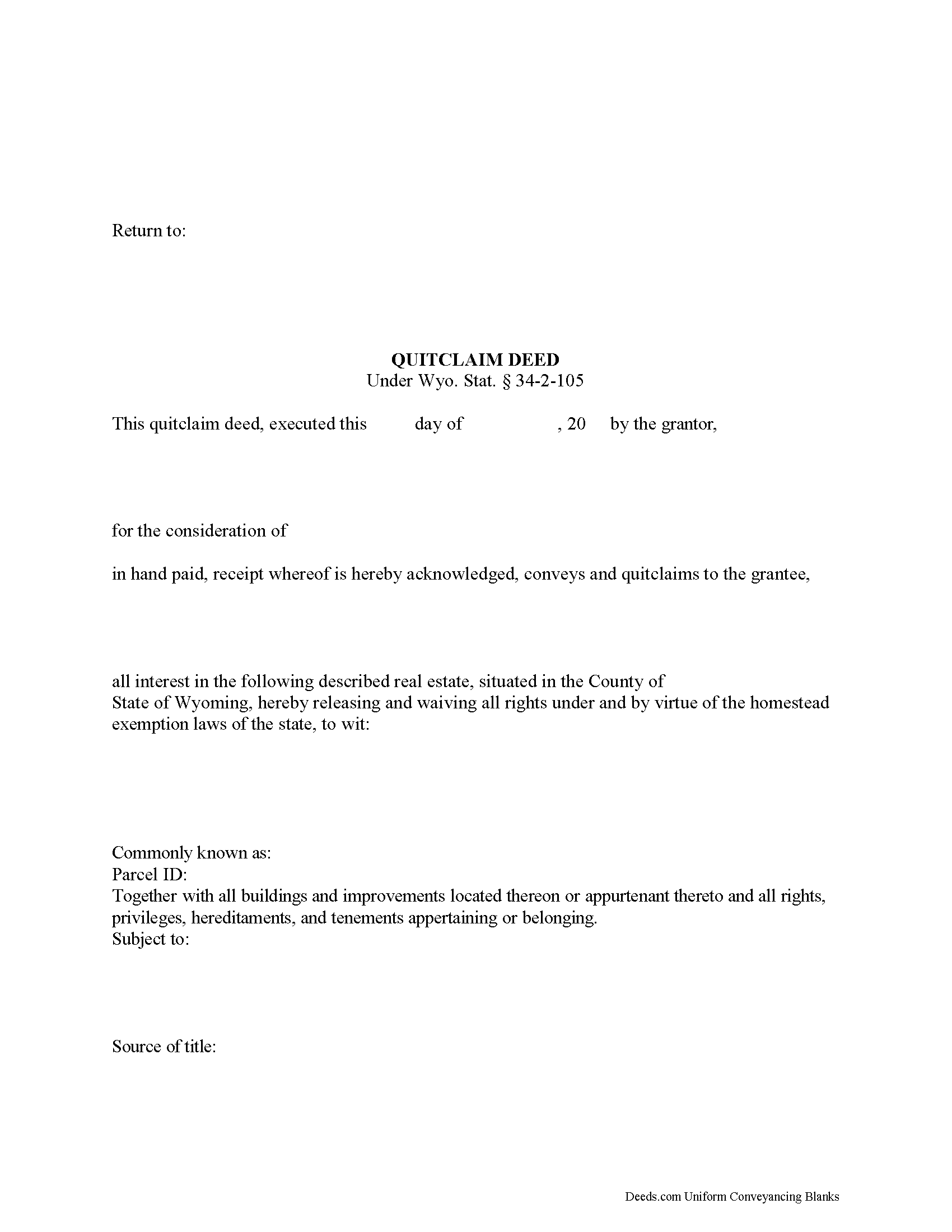
Quitclaim deeds transfer a grantor's (owner) interest in real estate, if any, to a grantee (buyer). The deeds do not include any warranties of title, so they offer no protection to the grantee. They are, in effect, "as-is" deeds. Because quitclaim deeds lack warranties, their most common uses are for transfers between spouses/family members, in divorces, and to clear simple title issues.
A quitclaim deed submitted for recording in Wyoming must identify the grantor and grantee by name. In order to be considered properly executed, the following information should be included: the grantor's name and mailing address, the consideration paid for the real property, the words "conveys and quitclaims," the grantee's name and mailing address, a legal description of the real estate, the county the real estate is situated in, and the date of execution. If there is more than one grantor or grantee, each grantor and grantee's name and address must be provided. An original signature is needed for each grantor listed in the quitclaim deed. (Wyo. Stat. 34-2-104, 2012). The grantor's signature must be acknowledged by a notarial officer and should be in compliance with the requirements of Wyoming... More Information about the Wyoming Quitclaim Deed
Gift Deed
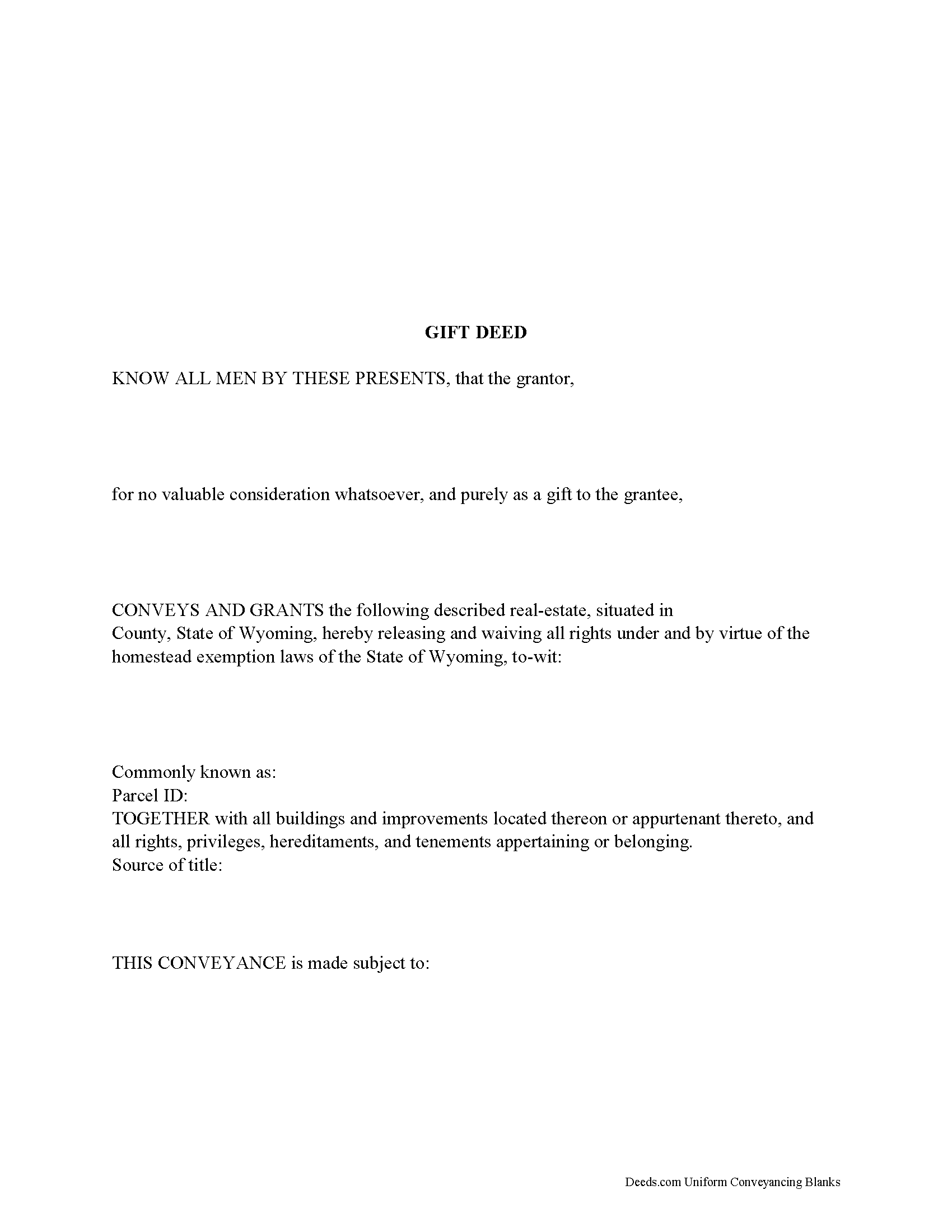
A gift deed, or deed of gift, is a legal document voluntarily transferring title to real property from one party (the grantor or donor) to another (the grantee or donee). A gift deed typically transfers real property between family or close friends. Gift deeds are also used to donate to a non-profit organization or charity. The deed serves as proof that the transfer is indeed a gift and without consideration (any conditions or form of compensation).
In order for gift deeds to be valid they must meet the following requirements: The grantor must intend to make a present gift of the property, the grantor must deliver the property to the grantee, and the grantee must accept the gift. A gift deed must contain language that explicitly states no consideration is expected or required, because any ambiguity or reference to consideration can make the deed contestable in court. A promise to transfer ownership in the future is not a gift, and a deed that does not immediately transfer the interest in the property, or meet any of the aforementioned requirements, may be revoked [1].
A lawful gift deed includes the grantor's full name and marital status, as well as the grantee's full name, ... More Information about the Wyoming Gift Deed
Warranty Deed
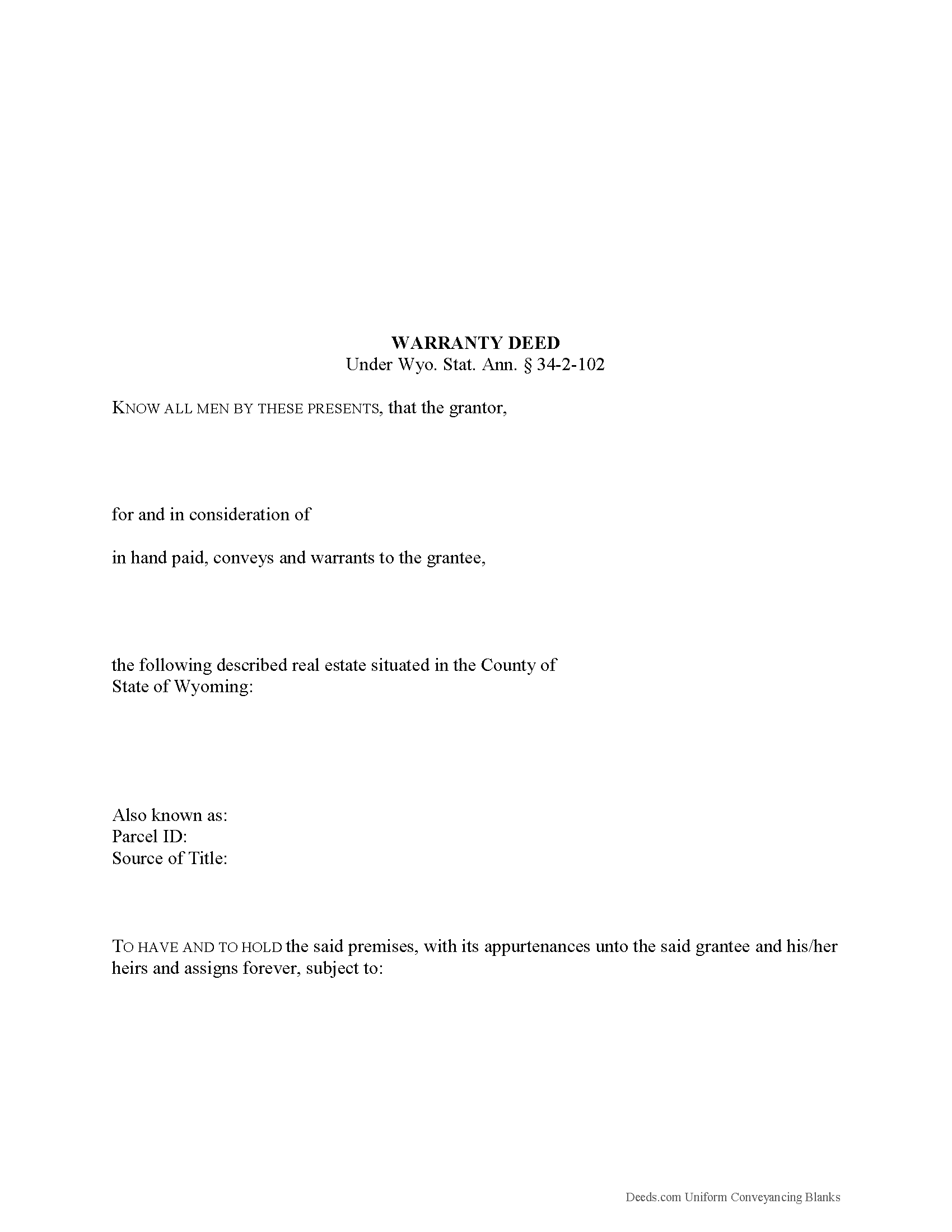
In Wyoming, title to real property can be transferred from one party to another using a warranty deed. When recorded, a warranty deed conveys an interest in real property to the named grantee with full warranties of title. A warranty deed offers the most assurance of title. This assurance is greater than that of a limited or special warranty deed, which guarantees the title only against claims that arose during the time the grantor held title to the property, or a quitclaim deed, which offers no warranties of title.
Warranty deeds are statutory conveyances under Wyo. Stat. Ann. 34-2-102. A warranty deed conveys real property in fee simple to the grantee and contains covenants from the grantor that he or she holds title to the property and has "good right and power to convey the same" (Wyo. Stat. Ann. 34-2-103). The covenant guarantees that the property is "free from all incumbrances" and that the grantor "warrants to the grantee, his heirs and assigns, the quiet and peaceful possession of such premises, and will defend the title thereto against all persons who may lawfully claim the same" (34-2-103). The use of the words "convey and warrant" in the deed implies full warranties o... More Information about the Wyoming Warranty Deed
Special Warranty Deed

In Wyoming, title to real property can be transferred from one party to another using a special warranty deed. When recorded, a special warranty deed conveys an interest in real property to the named grantee with limited warranties of title.
Special warranty deeds are statutory conveyances under Wyo. Stat. Ann. 34-2-136. A special warranty deed conveys real property in fee simple to the grantee and contains a covenant from the grantor that the property is "free from all encumbrances made by that grantor" (34-2-137). This means that the deed will not protect the grantee against title issues that arose prior to the time the grantor acquired title. The covenant guarantees that the grantor will "forever warrant and defend the title of the property in the grantee, the grantee's heirs and assigns against any lawful claim and demand of the grantor and any person claiming or to claim by, through, or under the grantor, but against none other" (34-2-137). The deed must contain the specific granting language "conveys and specially warrants" in order to establish this covenant.
A lawful special warranty deed includes the grantor's full name, mailing address, and marital status, the con... More Information about the Wyoming Special Warranty Deed
Grant Deed
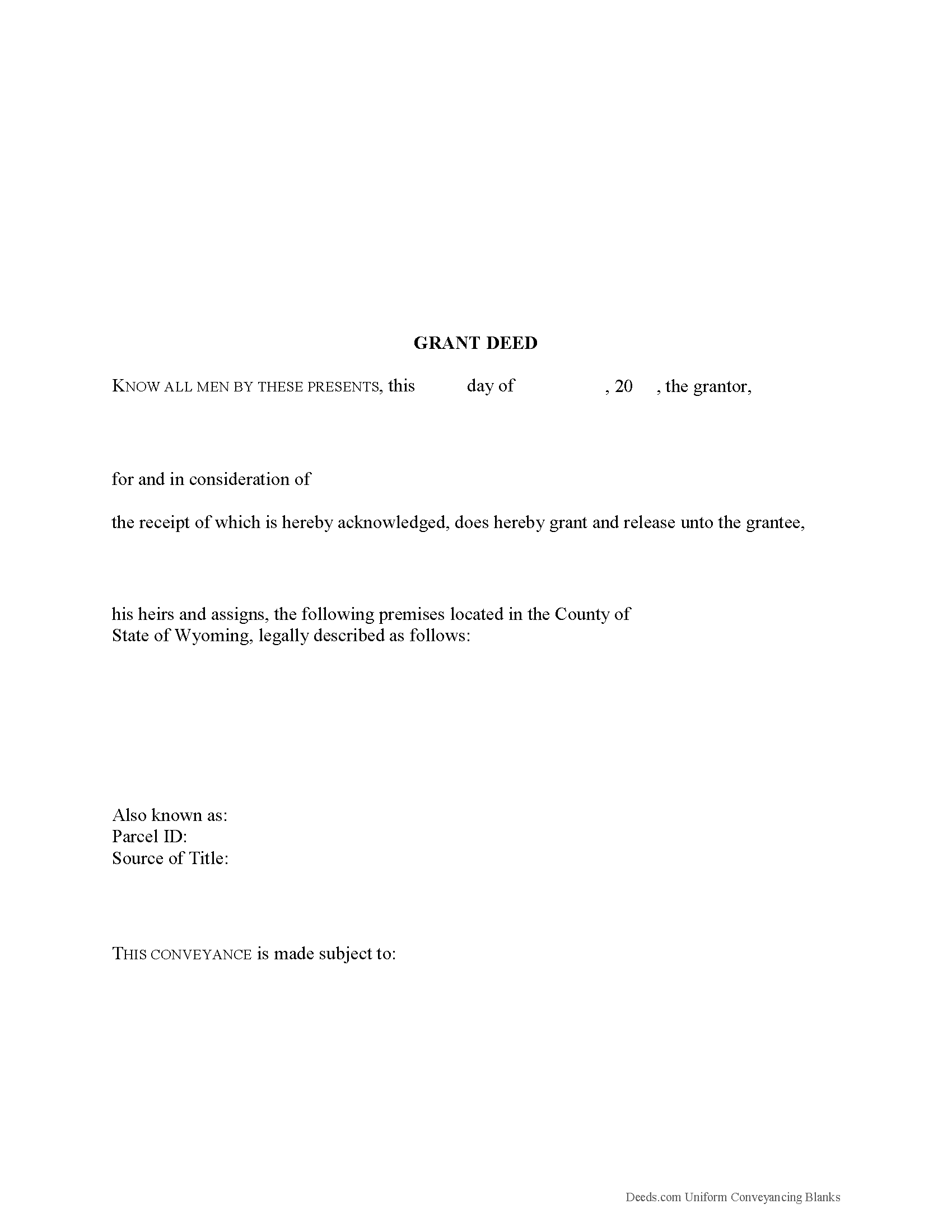
In Wyoming, title to real property can be transferred from one party to another using a grant deed. Every conveyance of real estate in Wyoming passes all the estate of the grantor, unless the intent to pass a lesser estate is expressly stated in the deed or is implied in the terms of the grant (Wyo. Stat. Ann. 34-2-101).
Use a grant deed to transfer title with warranties on the part of the grantor that he or she has not previously conveyed the estate and that he or she has not encumbered the property, except for any restrictions noted in the deed. Grant deeds offer more protection for the buyer than quitclaim deeds, but less than warranty deeds. A quitclaim deed offers no warranty of title, while a warranty deed guarantees, among other things, that the grantor holds clear title to the real property being conveyed and protects the grantee from any future claims to the property.
A lawful grant deed includes the grantor's full name, mailing address, and marital status, the consideration given for the transfer, and the grantee's full name, marital status, vesting, and mailing address. Vesting describes how the grantee holds title to the property. Generally, real property is own... More Information about the Wyoming Grant Deed
Interspousal Transfer Grant Deed
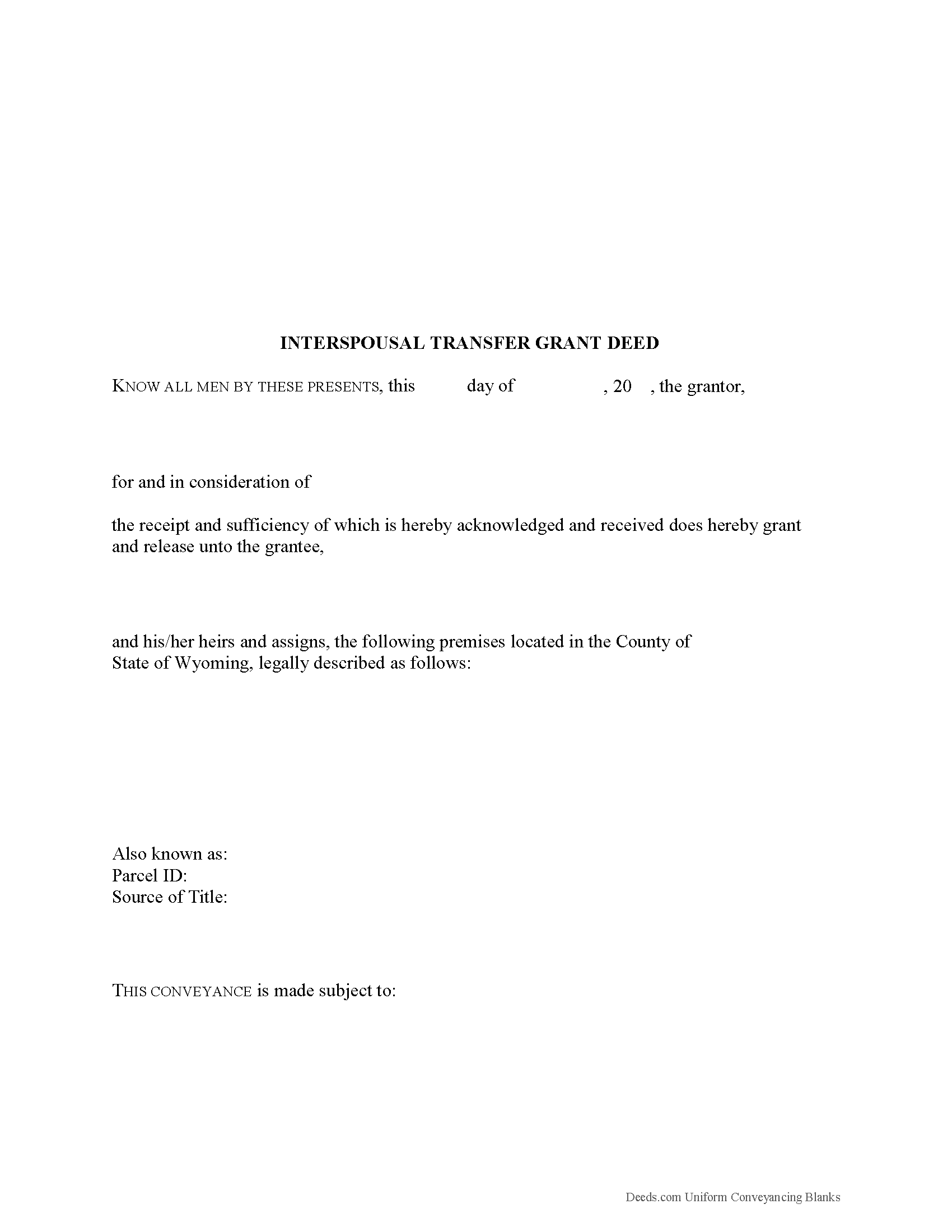
Transferring Real Property between Spouses in Wyoming
In Wyoming, spouses have options for voluntary transfers of title to real property from one to the other. Quitclaim deeds can serve that purpose without specific guarantees, but an interspousal transfer grant deed offers more protection. In addition, using this type of deed avoids the necessity for property tax reassessment. They can also be used in situations where both spouses hold title to real estate and one transfers his or her interest in the property to the other. It can also be used in situations where one spouse holds title to real estate in sole ownership and voluntarily transfers his or her interest in the property to his or her spouse [1].
Unlike a quitclaim deed, a grant deed guarantees that the grantor (seller) has a present interest in the property, and, when recorded, provides evidence of a change of title to the grantee (buyer). It also includes a warranty that the property is not encumbered by any undisclosed liens or restrictions, which means that there are no legal claims to the title by third parties.
A lawful grant deed includes the grantor's full name, mailing address, and marital status, the con... More Information about the Wyoming Interspousal Transfer Grant Deed
Correction Deed
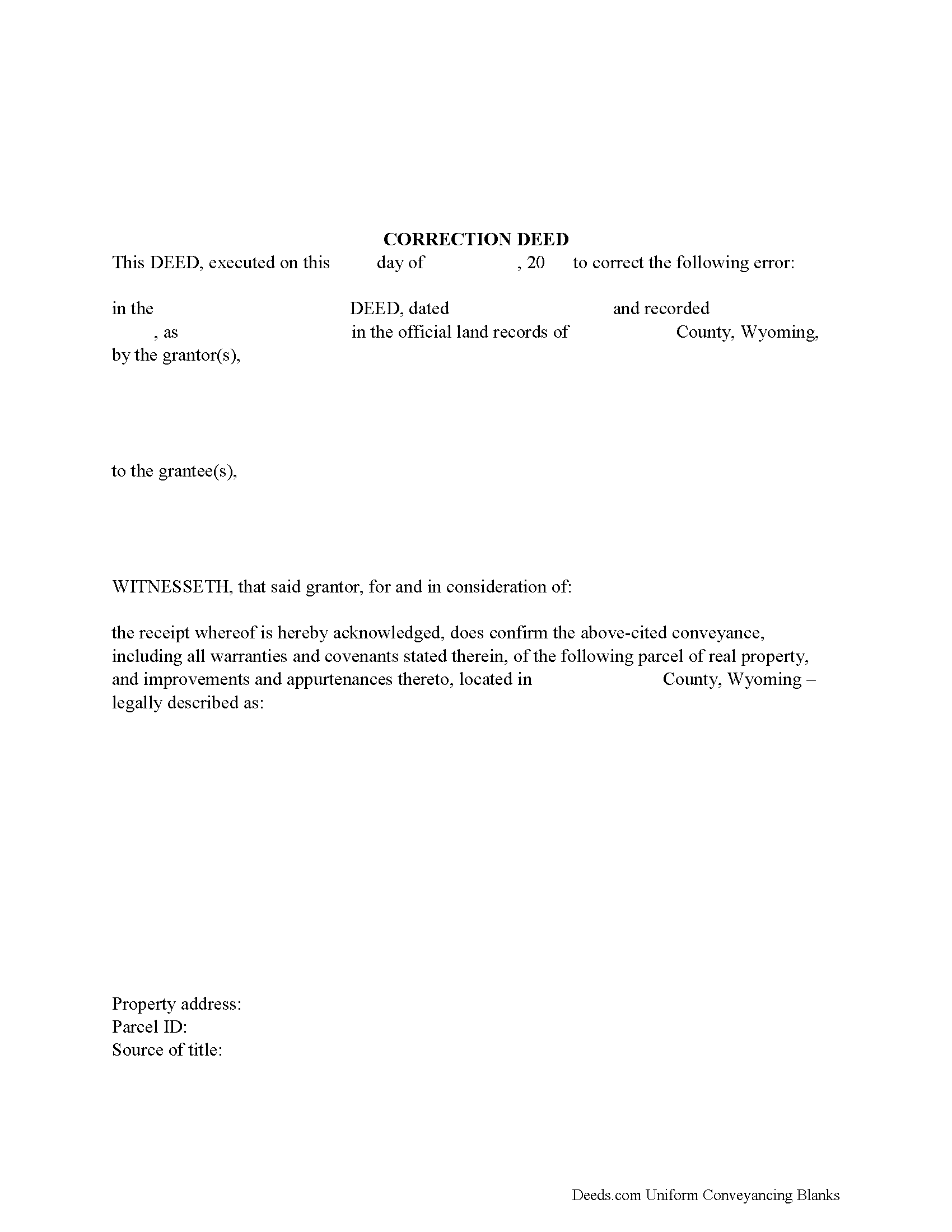
Use the correction deed to correct an error in a previously recorded deed of conveyance, such as a warranty or quitclaim deed, in Wyoming.
Correcting an error in a recorded deed helps prevent problems that might arise when the current owner tries to sell the property. The best method for correction is to prepare and record a new document, often called a corrective or correction deed. This document does not convey title; instead, it confirms the prior conveyance of the property.
Apart from supplying the correct information, the new deed must give the reason for the correction by identifying the error. It also must reference the prior deed by title, date, and recording number. The original grantor signs the corrective deed, which confirms the property transfer to the grantee. Generally, deeds of correction are used to address minor omissions and errors in a recorded document, such as typos, accidentally omitted suffixes or middle initials of names. When correcting the legal description, both grantor and grantee should sign the corrective instrument to avoid doubt regarding any portions of the conveyed property.
For certain changes, however, a correction deed cannot be used... More Information about the Wyoming Correction Deed
Easement Deed
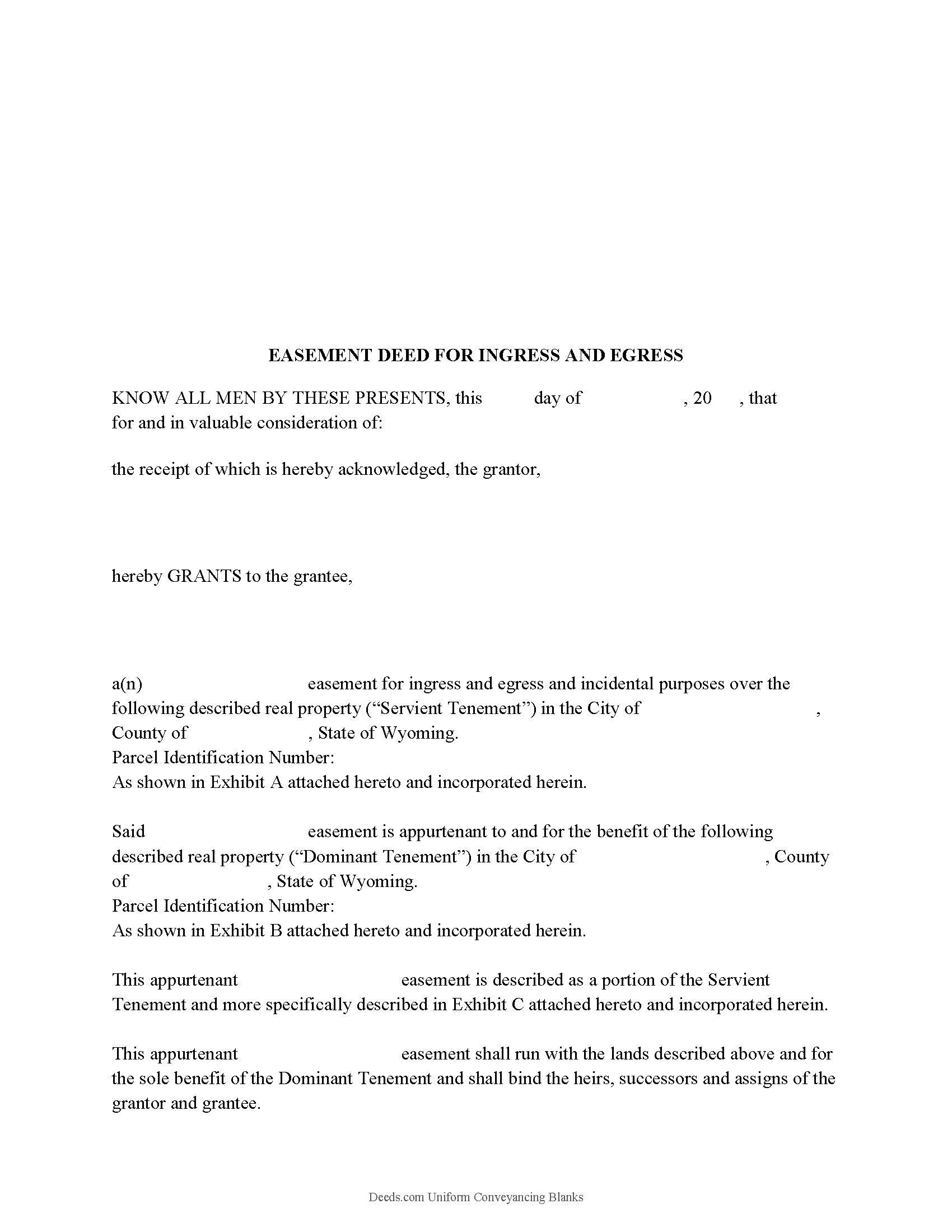
An easement is the legal right to use another person's property for a specific purpose and is also a non-possessory interest in real property that can be created by a deed in writing. An easement deed is the instrument that creates the rights contained in an easement. Easements in Wyoming that do not specifically describe the location of the easement are null and void and of no force and effect, except as may be provided by law. However, an easement that does not describe the location will be valid for a period of one year from the date of execution of the easement. If the specific description is not recorded within one year, then the easement will be of no further force and effect (34-1-141a, c). Easements can also be created for the purpose of wind energy rights in Wyoming. Wind energy rights are regarded as an interest in real property and are appurtenant to the surface estate (34-27-103).
The easement deed should be acknowledged by the party executing the deed, before any notarial officer. Further, a certificate of the acknowledgment of any deed will entitle such deed to be recorded in the office of the county clerk in the county where the property is located (34-1-113). A d... More Information about the Wyoming Easement Deed
Termination of Easement
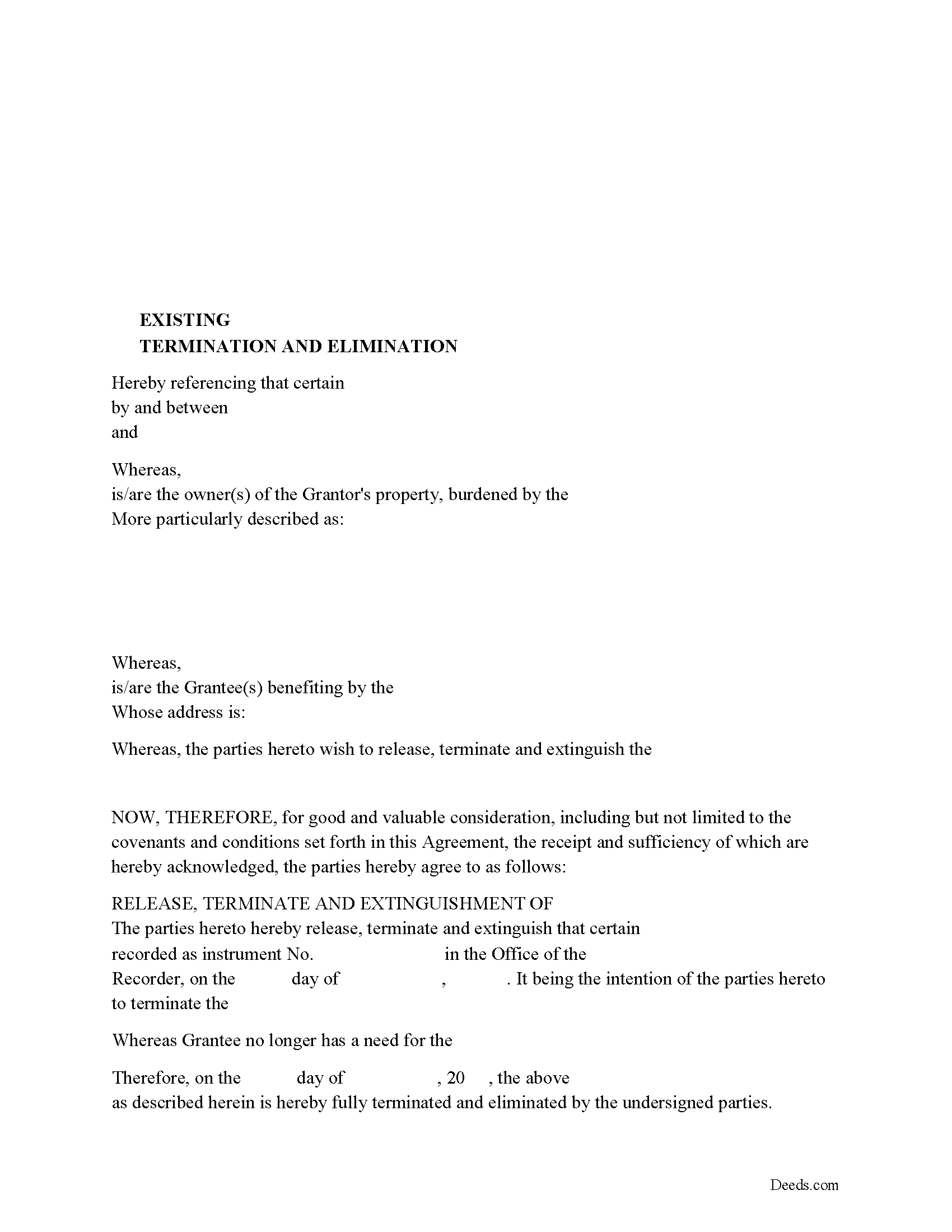
Use this form to release, terminate, extinguish a previously recorded document that involves access to and from a property.
Documents such as:
1. Easement Deeds or Agreements (An easement is a non-possessory interest in land, granting the right to use someone else's property for a specific purpose, like a driveway or utility line)
2. Access Roads
3. Right of Ways
4. Utility Easements (Power, Gas, Water, Sewer, Etc.)
5. Drainage Easements
This document allows the owner of the land, burdened by the access and the party that benefits from the access, to sign an agreement releasing the property from such access, ... More Information about the Wyoming Termination of Easement
Mineral Deed
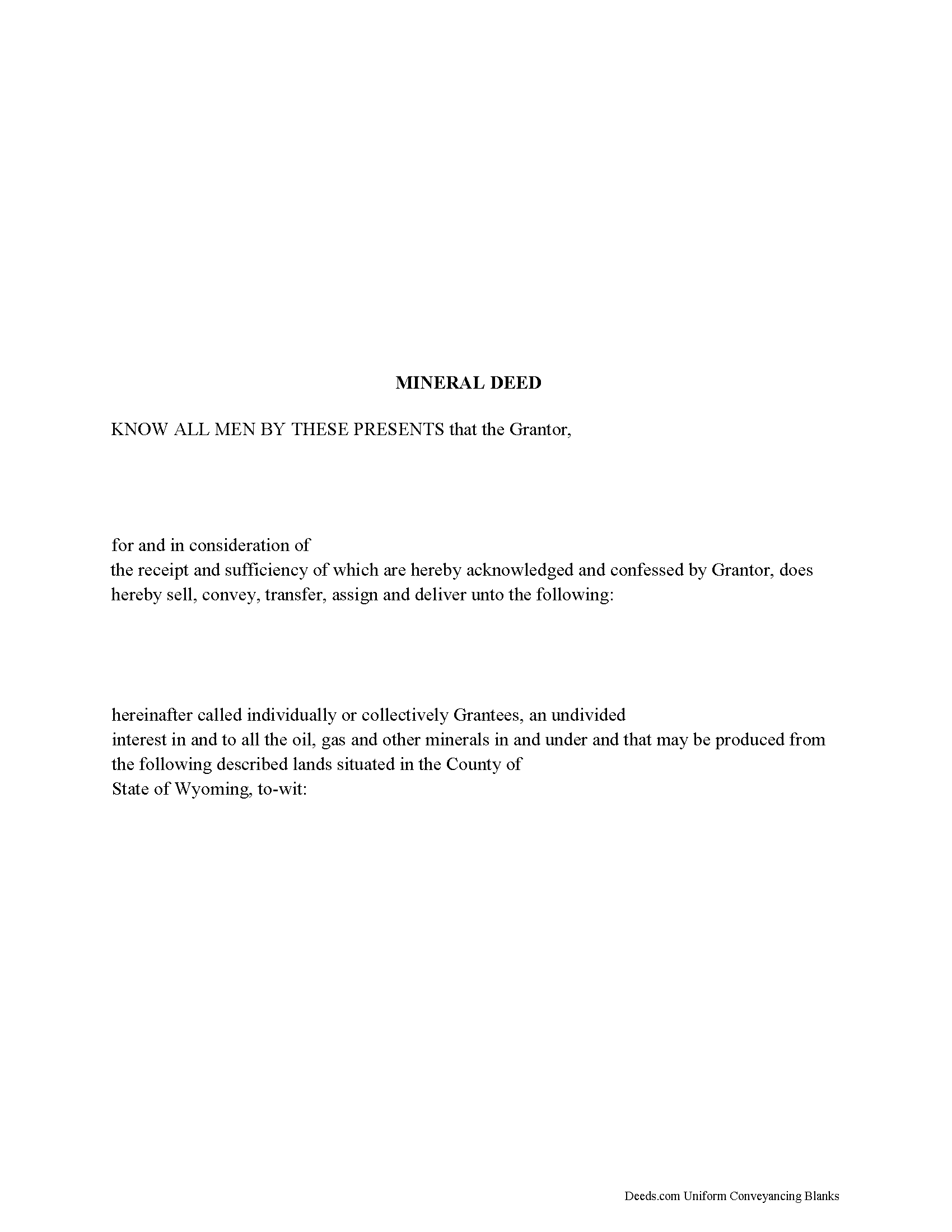
The General Mineral Deed in Wyoming transfers oil, gas, and mineral rights from the grantor to the grantee. THIS IS NOT A LEASE. There are no Exceptions or Reservations included.
The transfer includes the oil, gas and other minerals of every kind and nature. It also transfers any and all rights to receive royalties, overriding royalties, net profits interests or other payments out of or with respect to those oil, gas and other minerals. The Grantor can stipulate the percentage of Mineral Rights the Grantee will receive and is made subject to any rights existing under any valid and subsisting oil and gas lease or leases of record.
This general mineral deed gives the grantee the right to access, for the purpose of mining, drilling, exploring, operating and developing said lands for oil, gas, and other minerals, and storing handling, transporting and marketing of such.
In this document the Grantor Warrants and will defend said Title to Grantee. Use of this document has a permanent effect on your rights to the property, if you are not completely sure of what you are executing seek the advice of a legal professional.
(Wyoming MD Package includes form, guidelines, and complet... More Information about the Wyoming Mineral Deed
Mineral Quitclaim Deed
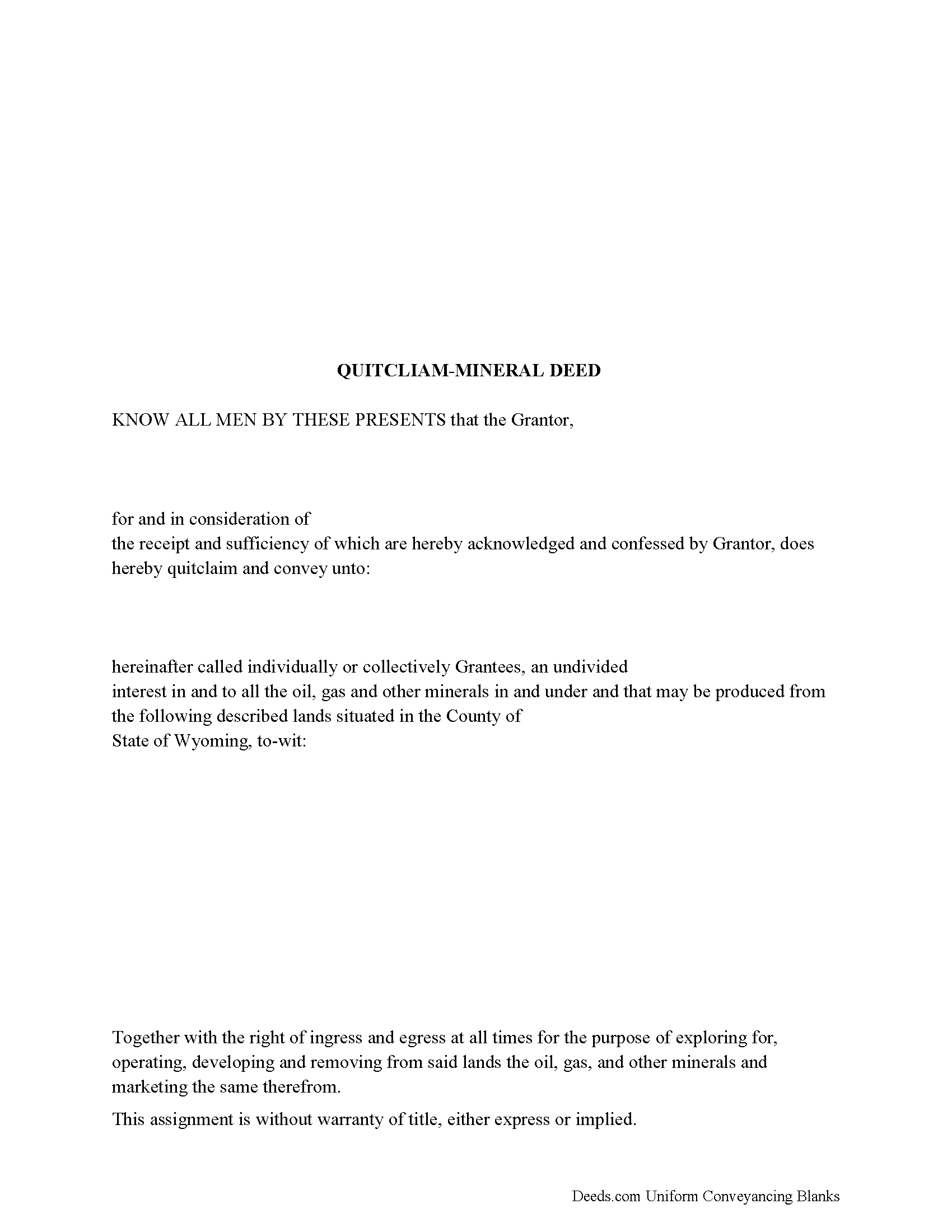
The General Mineral Deed in Wyoming Quitclaims oil, gas, and mineral rights from the grantor to the grantee. THIS IS NOT A LEASE. There are no Exceptions or Reservations included.
The transfer includes the oil, gas and other minerals of every kind and nature. The Grantor can stipulate the percentage of Mineral Rights the Grantee will receive.
This general mineral deed gives the grantee the right to access, for the purpose of mining, drilling, exploring, operating and developing said lands for oil, gas, and other minerals, and storing handling, transporting and marketing of such.
The seller, or grantor Quitclaims the mineral rights and does NOT accept responsibility to any discrepancy of title (This assignment is without warranty of title, either express or implied)
Uses: Mineral deeds with quitclaim are often used in situations where the grantor wants to quickly release any interest they might have in mineral rights, such as in settling estates, resolving disputes, clearing up uncertainties about ownership in a title's history or when mineral rights have previously been severed or fragmented from surface rights and cloud a title, making it difficult to transfer property... More Information about the Wyoming Mineral Quitclaim Deed
Mortgage and Promissory Note
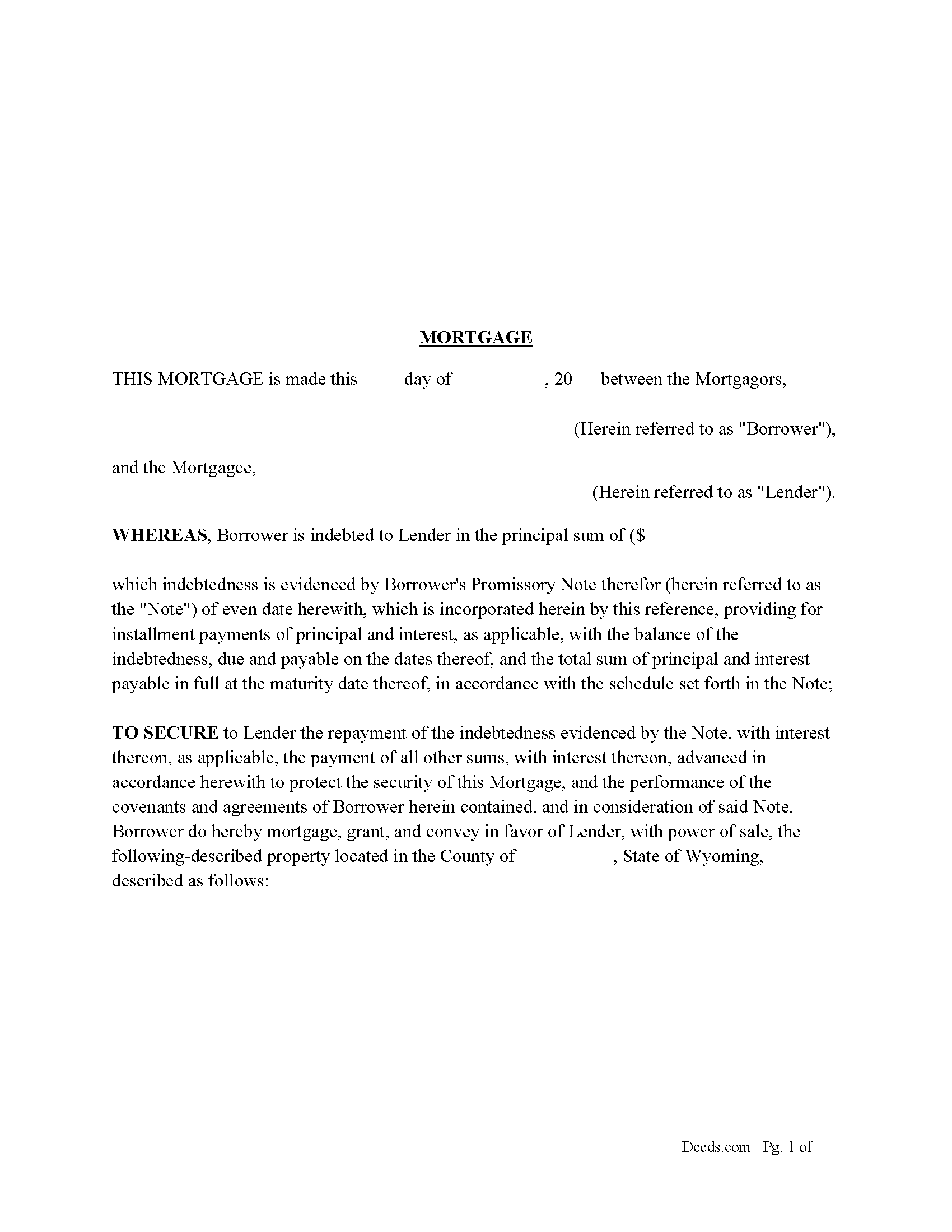
34-1-113. Acknowledgment of conveyances; generally. Execution of deeds, mortgages or other conveyances of lands, or any interest in lands, shall be acknowledged by the party or parties executing same, before any notarial officer. The notarial officer taking such acknowledgment shall comply with the requirements of W.S. 32-3-109.
34-1-118. Where conveyance to be recorded.A certificate of the acknowledgment of any deed, mortgage or conveyance, or proof of the execution thereof, before a notarial officer, shall entitle such deed, mortgage or conveyance, certificate or certificates aforesaid, to be recorded in the office of the county clerk in the county where the land lies.
34-1-119. Duties of county clerk generally. (a) The county clerk of each county within this state shall receive and record at length all deeds, mortgages, conveyances, patents, certificates and instruments left with him for that purpose, and he shall endorse on every such instrument the day and ... More Information about the Wyoming Mortgage and Promissory Note
Release of Mortgage
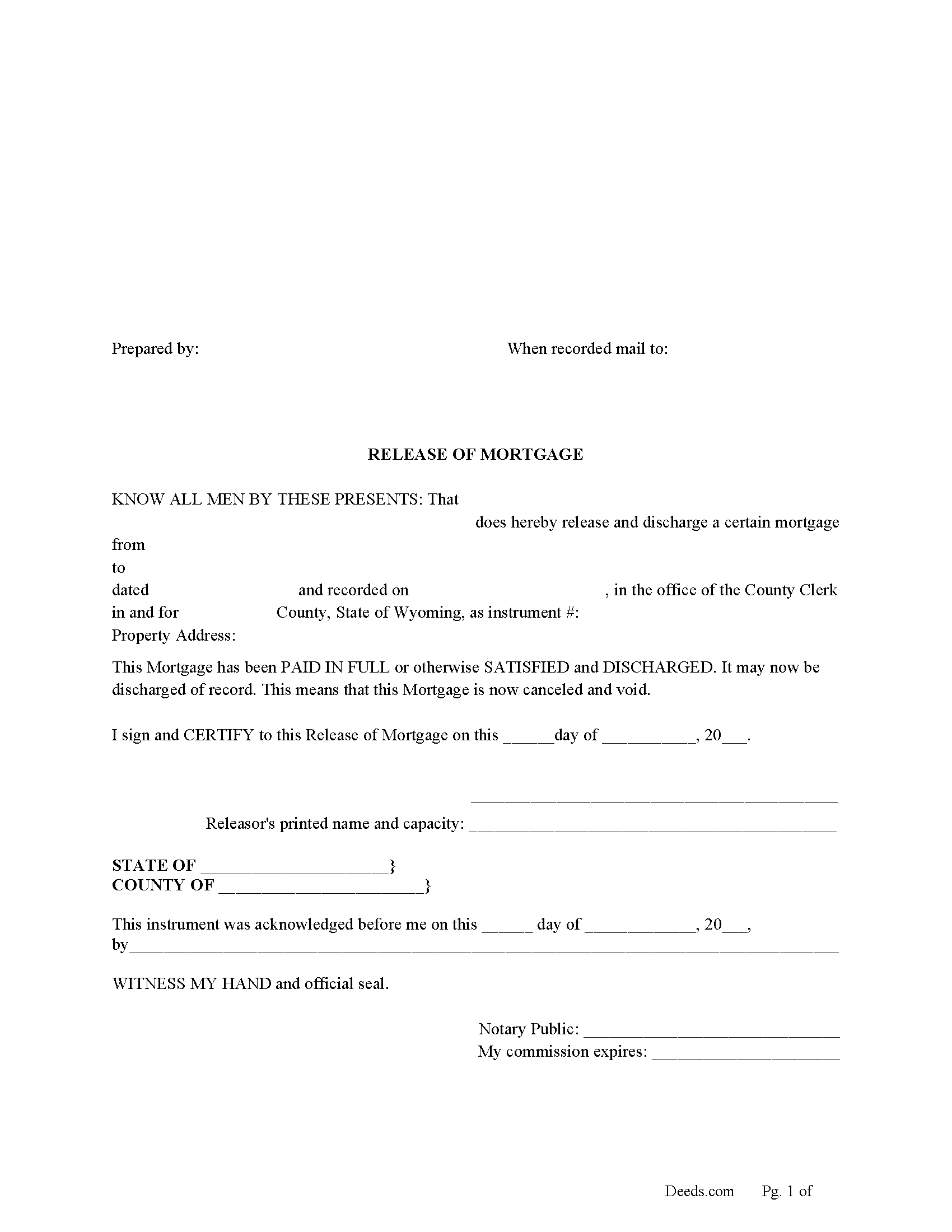
Use this form to release a previously recoded mortgage when it is paid in full. (Any mortgage or deed of trust shall be discharged upon the record thereof, by the county clerk in whose custody it shall be, or in whose office it is recorded, when there shall be recorded in his office a certificate or deed of release executed by the mortgagee, trustee or beneficiary, his assignee or legally authorized representative, or by a title agent or title insurer acting in accordance with the provisions of W.S. 34-1-
145 through 34-1-150)(Wyoming Statute 34-1-130)
A lender/mortgagee generally has 30 days to release a Mortgage to avoid penalty.
((a) A mortgagee shall, within thirty (30) days after having received by certified or registered mail a request in writing for the discharge or release of a mortgage, execute and acknowledge a certificate or deed of discharge or release of the mortgage if there has been full performance of the condition of the mortgage and if there is no other written agreement between the mortgagee and mortgagor encumbering the property subject to the mortgage.
(b) A mortgagee who fails or refuses to discharge or release a mortgage within the thirty (30) day... More Information about the Wyoming Release of Mortgage
Assignment of Mortgage
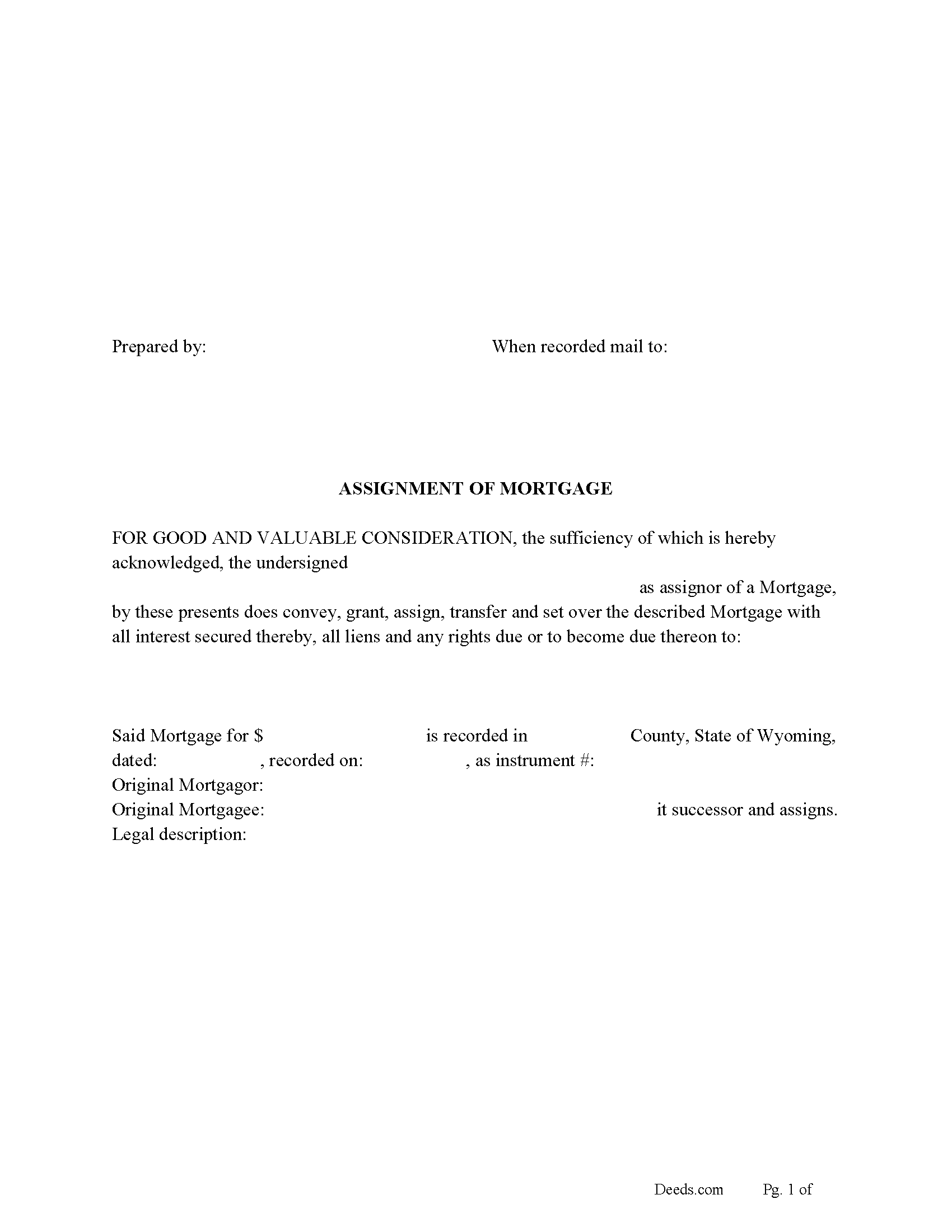
Use this form to assign all rights from a previously recorded mortgage to another entity/assignee. This is frequently done when a mortgage has been sold. (The county clerk shall not record any document until the address of the grantee, mortgagee or assignee of the mortgagee is furnished to the county clerk) (WS 34-1-119)
Current Borrowers must be notified of the assignment. Notification consists of contact information of the new creditor, recording dates, Wisconsin recording numbers, changes in loan, etc. Included are "Assignment of Mortgage Forms".
(The recording of the assignment of a mortgage, shall not in itself, be deemed notice of such assignment to the mortgagor, his heirs or personal representatives, so as to invalidate any payment made by them or either of them to the mortgagee.) (WY, 34-1-128. Recorded assignment of mortgage.)
The Truth and lending act requires that borrowers be notified when their mortgage debt has been sold, transferred, or assigned to a new creditor. It is the responsibility of the new creditor to notify the borrower(s) within 30 days to avoid up to $2,000.00 in statutory damages, plus reasonable attorney's fees. Systematic violations can reac... More Information about the Wyoming Assignment of Mortgage
Personal Representative Deed
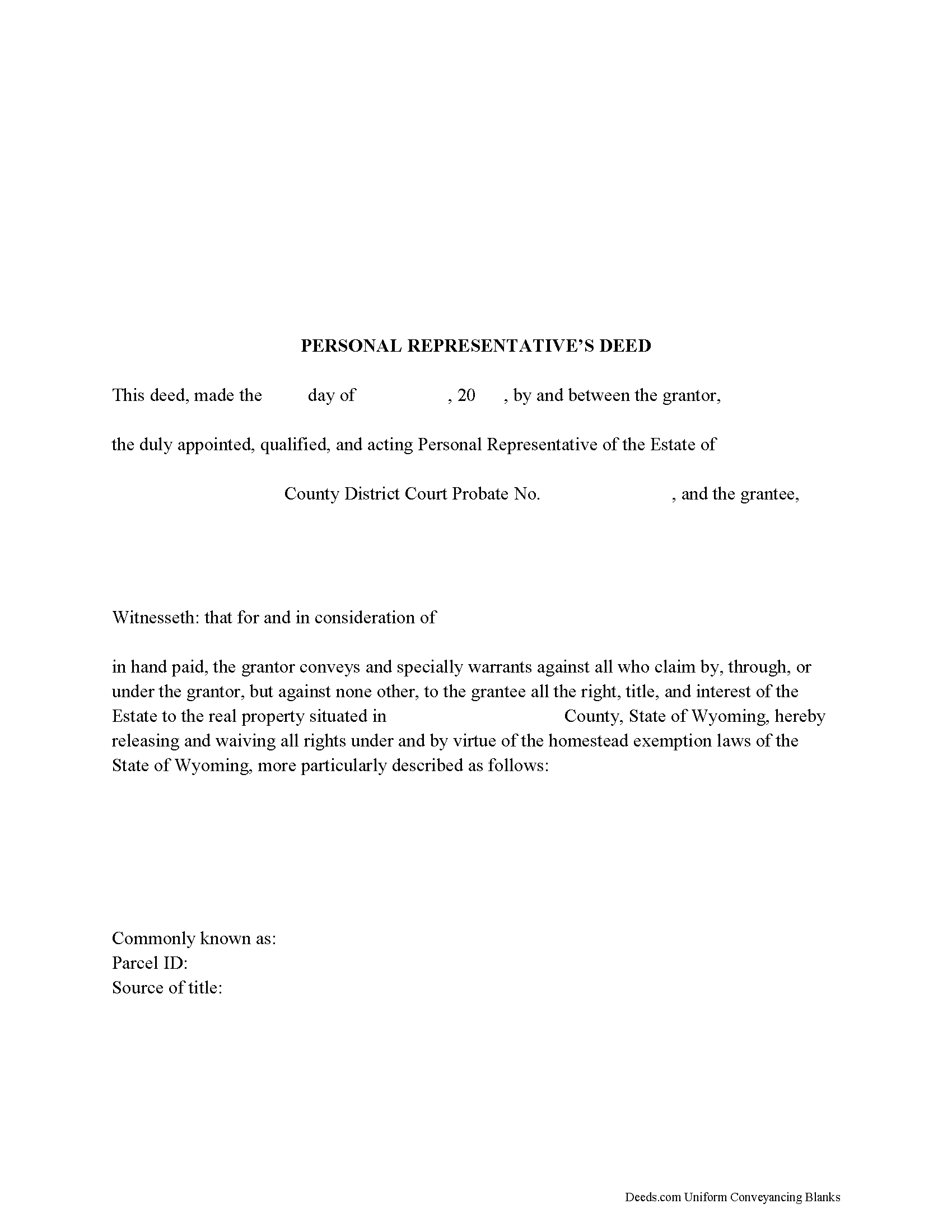
Devising and Distributing Real Estate in Wyoming
Probate is the court-supervised process of transferring a decedent's property to those entitled to receive it. In Wyoming, probate procedures are governed by Title 2 of the Wyoming Statutes (Chs. 1-18).
Generally, property held by the decedent in his or her name alone is subject to probate. Property held with a survivorship designation (real estate held in joint tenancy or tenancy by the entirety), a beneficiary designation (payable on death accounts and transfer on death accounts, for example), and property held in a trust generally transfer outside of probate. Wyoming also recognizes probate alternatives, such as "summary procedure" for qualifying small estates -- a less extensive informal probate. Consult a lawyer for guidance in determining the best course of estate administration, as each estate is unique, and many factors contribute to lawfully handling an administration.
In most cases requiring probate, the custodian of the decedent's will delivers it to the clerk of the district court in the county where the decedent resided at the time of death, along with a petition for probate and a certified copy of the death cer... More Information about the Wyoming Personal Representative Deed
Transfer on Death Deed
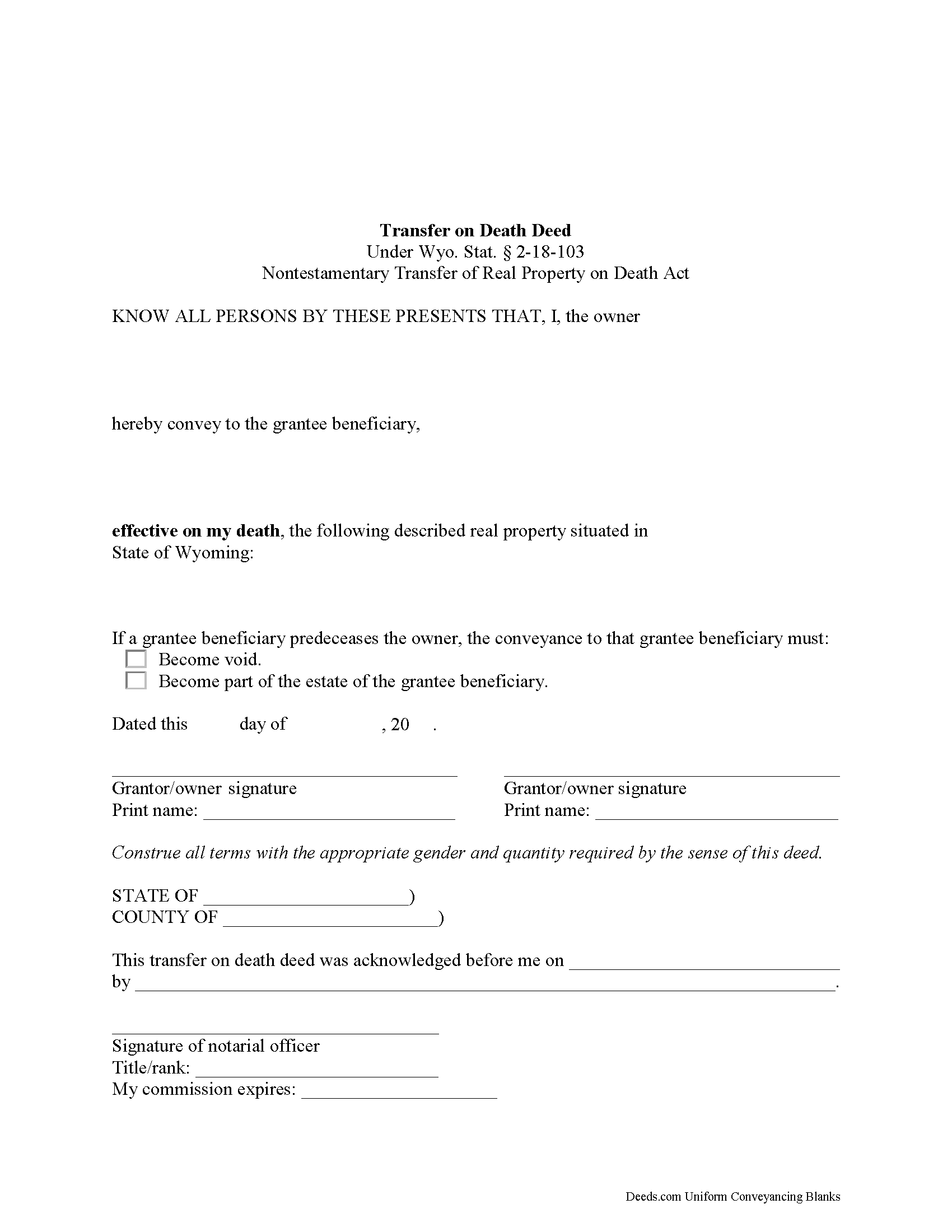
Wyoming's Non-testamentary Transfer of Real Property on Death Act went into effect on July 1, 2013. Find it at Sections 2-18-101-106 of the Wyoming Statutes.
A transfer on death deed is valid only if it is lawfully executed and recorded in the office of the county clerk for the county in which the real property is situated, before the death of the owner or the last surviving owner. See 2-18-103(d) for the rules concerning joint property owners, or contact an attorney for additional clarification.
By using transfer on death deeds (TODDs), people who own real estate in Wyoming have access to a flexible tool that allows them to direct what happens to their land after they die, independent from a will, and without the need for probate. As defined at 2-18-103, a TODD conveys the owner's interest in real property, subject to any debts or obligations in place during the owner's lifetime, to a designated grantee beneficiary. Note that, in addition to the providing the information required by the statutory form, TODDs must meet all state and local standards regarding format and content.
Until death, though, owners retain absolute interest in and control over the property, includin... More Information about the Wyoming Transfer on Death Deed
Transfer on Death Revocation
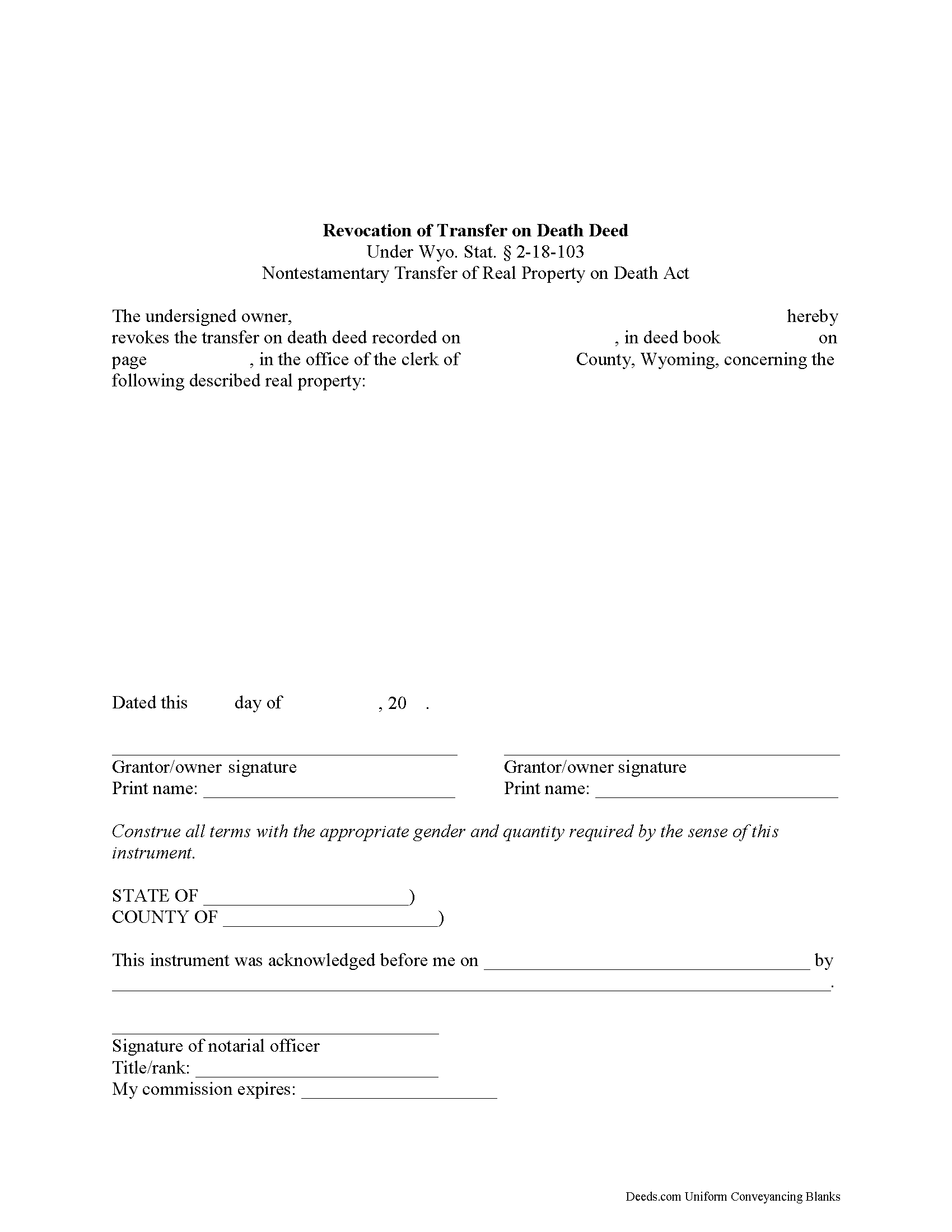
Wyoming's Non-testamentary Transfer of Real Property on Death Act went into effect on July 1, 2013. Find it at Section 2-18-101-106 of the Wyoming Statutes.
Note that a revocation of a transfer on death deed is valid only if it is lawfully executed and recorded in the office of the county clerk for the county in which the real property is situated, before the death of the owner or the last surviving owner. See 2-18-103(d) for the rules concerning joint property owners, or contact an attorney for additional clarification.
With transfer on death deeds (TODDs), people who own real estate in Wyoming have access to a flexible tool that allows them to direct what happens to their land after they die, independent from a will, and without the need for probate. Until death, though, owners retain absolute interest in and control over the property, including the power to revoke the transfer outright, without notice to or permission from the beneficiary. This feature is important because it allows owners to respond quickly to changes that arise.
There are three primary ways to revoke a recorded TODD. Owners simply execute and record either
-a statutory revocation document;
-a new ... More Information about the Wyoming Transfer on Death Revocation
Transfer on Death Affidavit
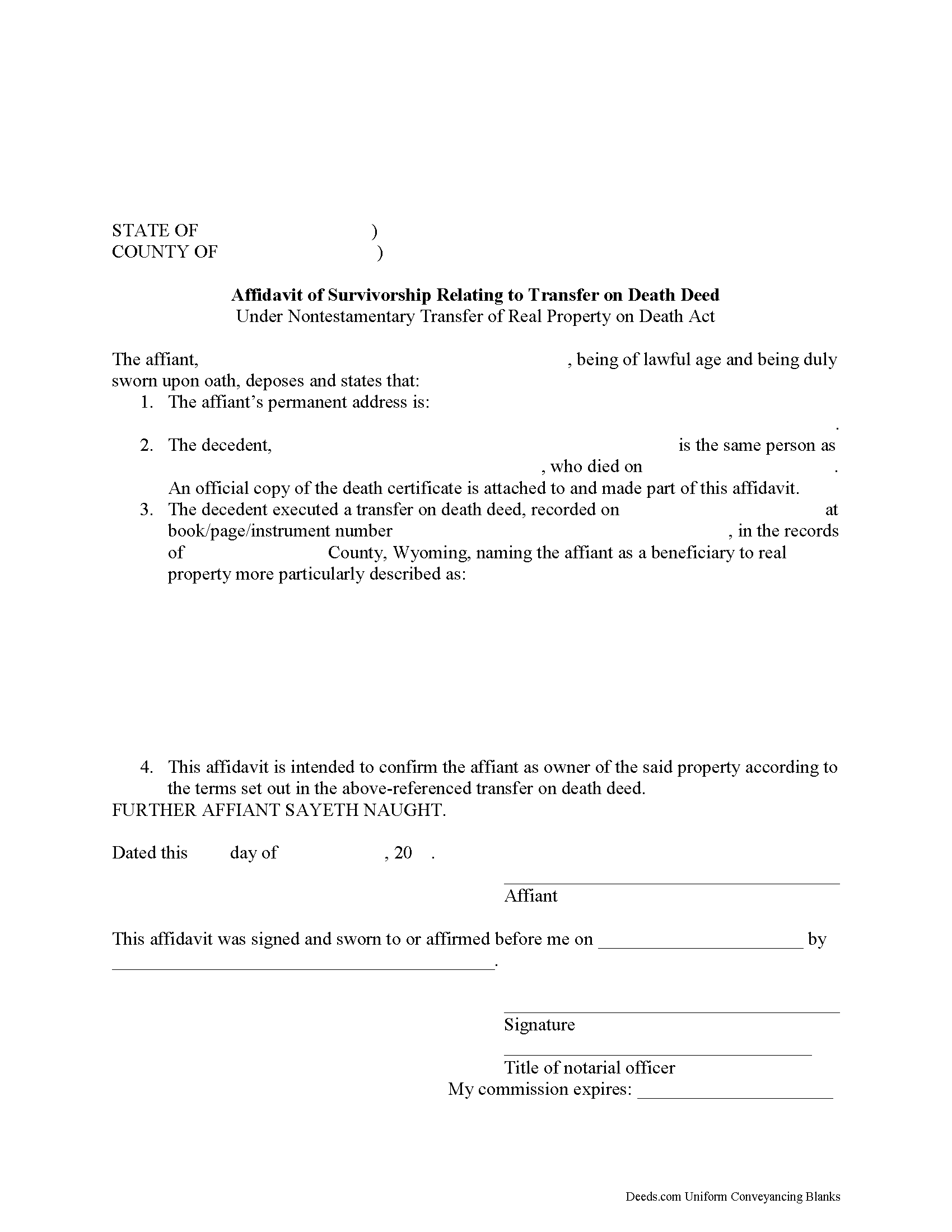
Wyoming's Non-testamentary Transfer of Real Property on Death Act went into effect on July 1, 2013. Find it at Sections 2-18-101-106 of the Wyoming Statutes.
By using transfer on death deeds (TODDs), people who own real estate in Wyoming have access to a flexible tool that allows them to direct what happens to their land after they die, independent from a will, and without the need for probate. As defined at W.S. 2-18-103, a TODD conveys the owner's interest in real property, subject to any debts or obligations in place during the owner's lifetime, to a designated grantee beneficiary. Until the owner dies, though, the beneficiary has absolutely no interest in or rights to the property.
To gain title to the property after the owner's death, beneficiaries must follow the procedure set out at W.S. 2-18-103(n). This involves completing and executing an affidavit of survivorship form, obtaining a certificate of clearance from the Wyoming department of health, and getting an official copy of the deceased owner's death certificate. Record the affidavit and accompanying documentation in the office of the county clerk of the county in which the real property is situated.
The proce... More Information about the Wyoming Transfer on Death Affidavit
Affidavit of Survivorship
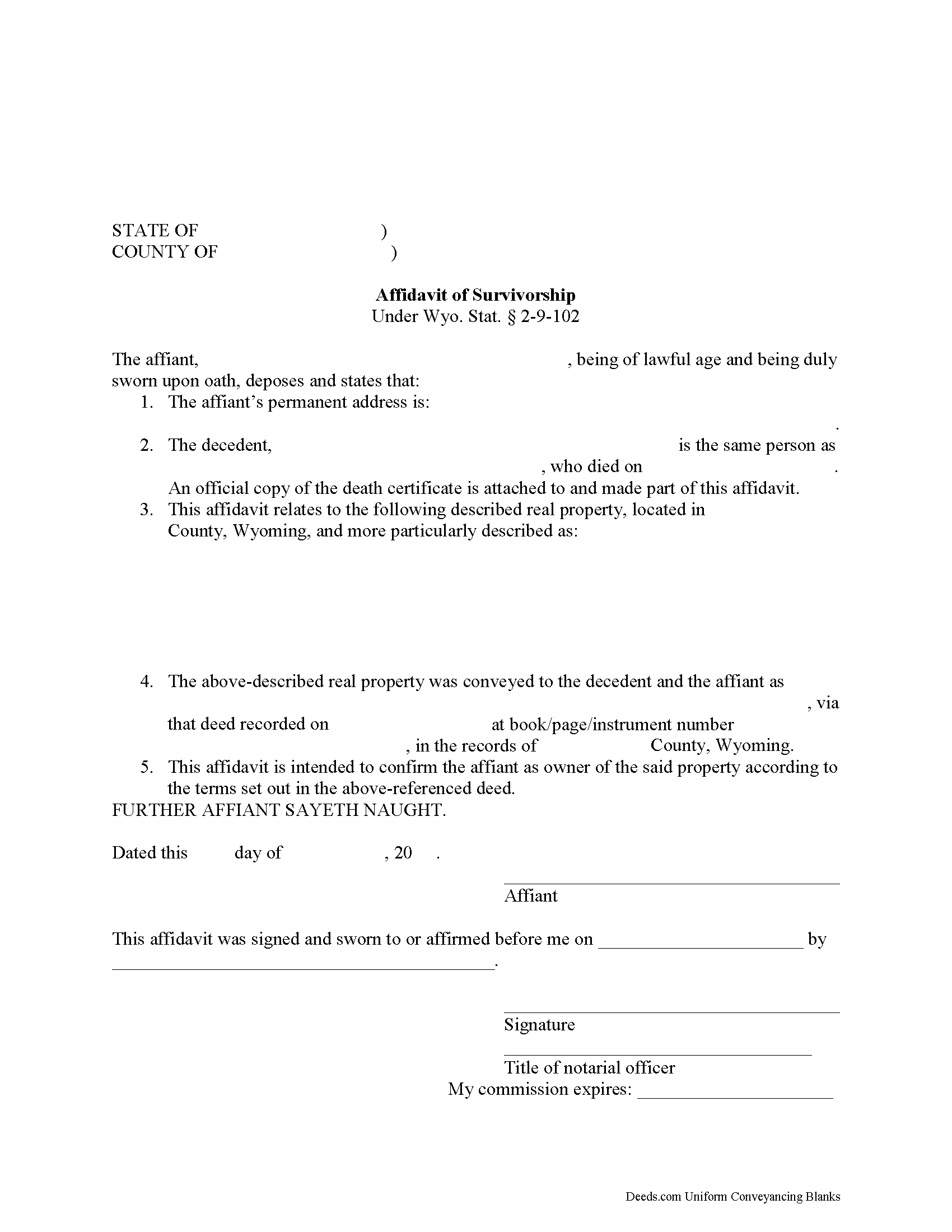
The Wyoming Statutes set out the rules for affidavits of survivorship at 2-9-102.
A general affidavit of survivorship is used in three primary situations:
- life estates, where the transfer of ownership is delayed until the life tenant dies;
- tenancy by entirety, where a married couple owned the property together and the surviving spouse gains full title when the other spouse dies; and
- joint tenancy with right of survivorship, in which two or more people share ownership of the property, and agree that when one owner dies, any remaining owners will share the deceased owner's rights to the property.
Individuals with one of these interests in real estate may transfer (or consolidate) title by completing an affidavit of survivorship, signing it in front of a notary, and recording it, along with an official copy of the deceased owner's death certificate, in the office of the county clerk for the county where the property is situated. This document is important because it helps to maintain a clear chain of title (ownership history) for the property, which, in turn, simplifies future transactions (sales, mortgages, etc.) involving the land.
This information may not apply in... More Information about the Wyoming Affidavit of Survivorship
Trustee Deed
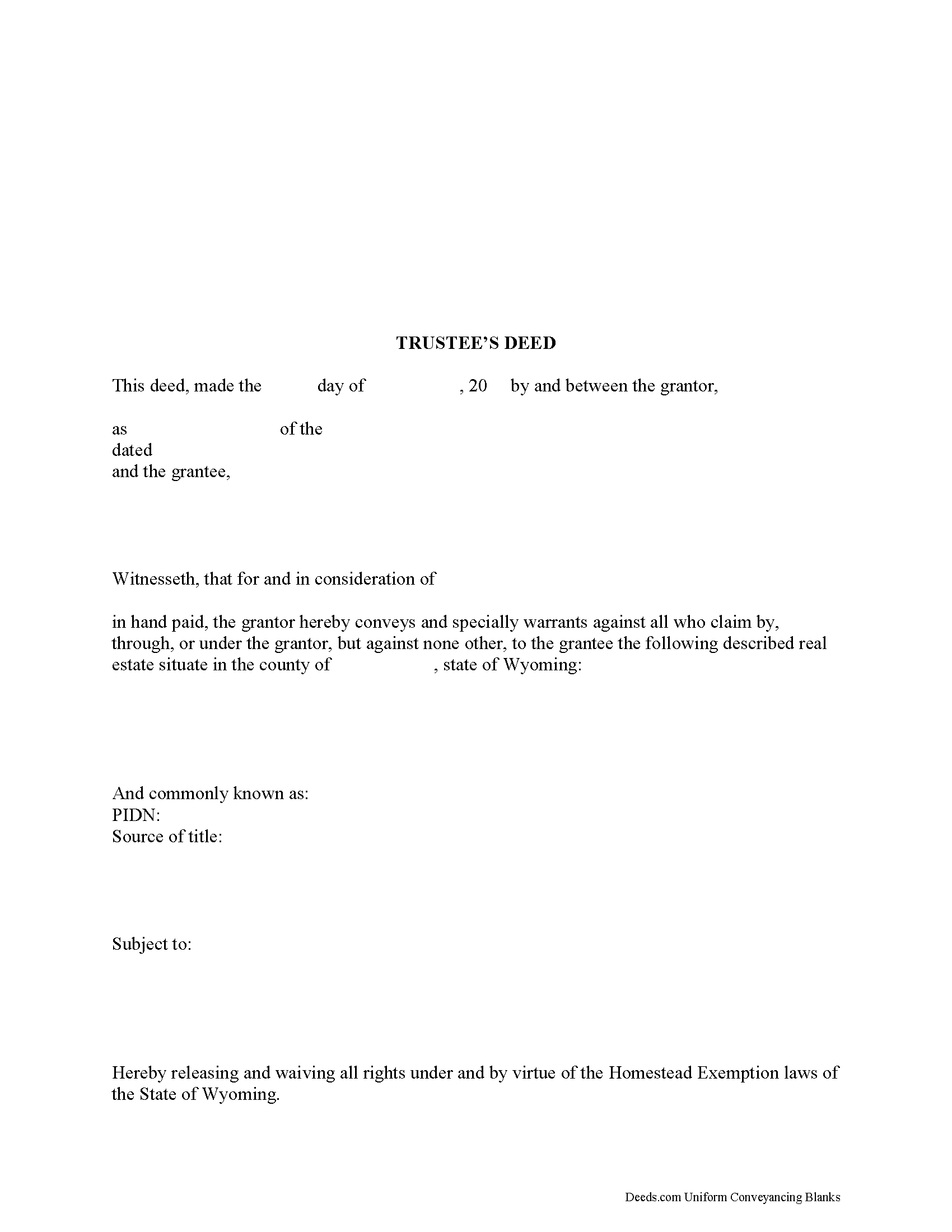
A trust is an arrangement whereby one person (the settlor) transfers property to another (trustee), who manages it for the benefit of a third (the beneficiary). A settlor may establish a trust to take effect during his lifetime (inter vivos trust), or a trust may be created upon his death through probate pursuant to the provisions of a will (testamentary trust).
The settlor creates a living trust by executing a trust instrument, which generally remains unrecorded. The settlor may elect to serve as the original trustee and name a successor trustee, who will assume the powers and duties of the trustee upon the settlor's death or incapacity.
When real property is transferred into the trust, the property belongs to the trust. As the trust itself cannot hold title to the property, the settlor must execute a deed titling the property in the name of the trustee on behalf of the trust. The trustee is bound to serve the trust pursuant to its terms and the powers and duties of trustees, codified at Wyo. Stat. Ann 4-10-801 to 4-10-817 as part of the Uniform Trust Code in Wyoming.
To convey real property out of the living trust, the trustee must execute a deed as the granting party. A... More Information about the Wyoming Trustee Deed
Special Power of Attorney for the Purchase of Property
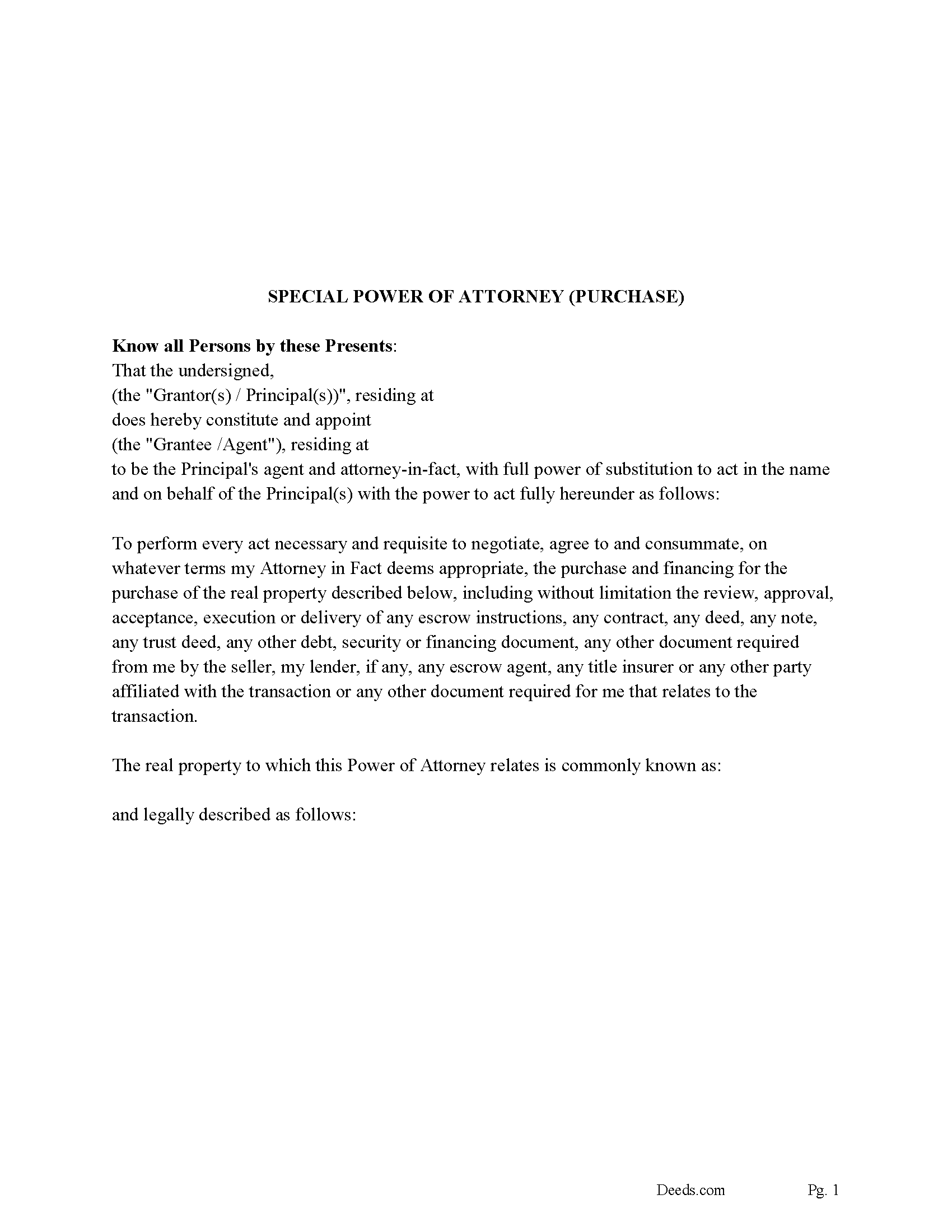
The (principal grants authority to an agent) to engage in purchasing and financing of a real property, located in the State of Wyoming. (3-9-102)(viii)
This power of attorney is "Durable" (not terminated by the principal's incapacity) (3-9-102)(ii)
Included is a "Special Instructions" section, where the agent's powers can be further limited and/or defined. This power of attorney terminates upon a date provided by the principle, providing your agent ample time to complete the purchase, example: 30, 60, 90 days.
The agent's certification form is signed by your agent verifying that the power of attorney and agent's authority are still active. This is often required by third parties, such as title companies.
In most circumstances this document will be recorded in the county where the property is located, formatted for recording in Wyoming Counties.
(Wyoming SPOA-Purchase Package includes form, guidelines, and completed example)
... More Information about the Wyoming Special Power of Attorney for the Purchase of Property
Special Power of Attorney for the Sale of Property
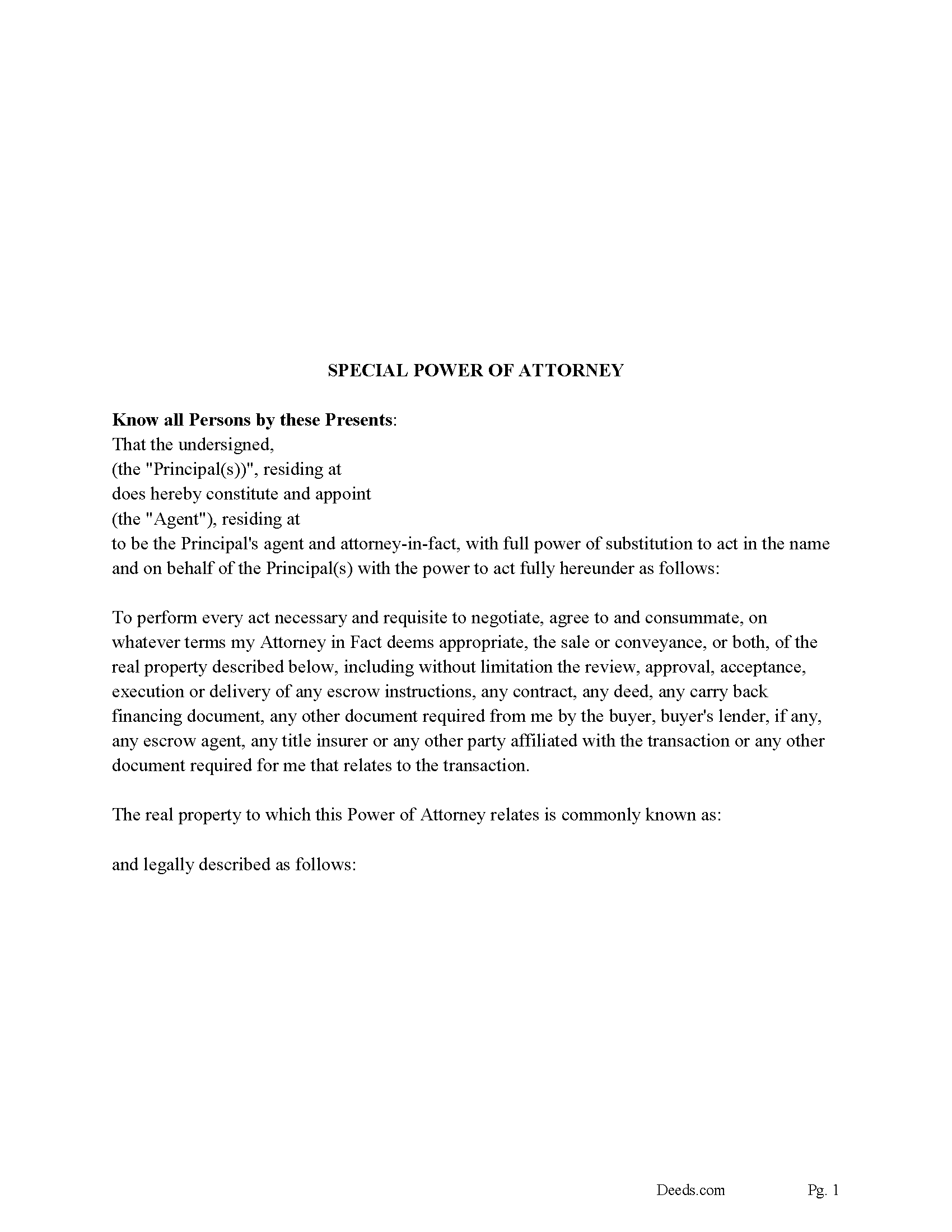
The (principal grants authority to an agent) to engage in the sale of a real property, located in the State of Wyoming. (3-9-102)(viii)
This power of attorney is "Durable" (not terminated by the principal's incapacity) (3-9-102)(ii)
Included is a "Special Instructions" section, where the agent's powers can be further limited and/or defined. This power of attorney terminates upon a date provided by the principle, providing your agent ample time to complete the purchase, example: 30, 60, 90 days.
The agent's certification form is signed by your agent verifying that the power of attorney and agent's authority are still active. This is often required by third parties, such as title companies.
This power of attorney will be governed by the laws of the State of Wyoming that apply to instruments negotiated, executed, delivered within the State of Wyoming
In most circumstances this document will be recorded in the county where the property is located, it's fully formatted for recording in Wyoming Counties.
(Wyoming SPOA-Sale Package includes form, guidelines, and completed example)
... More Information about the Wyoming Special Power of Attorney for the Sale of Property
Statutory Durable Power of Attorney
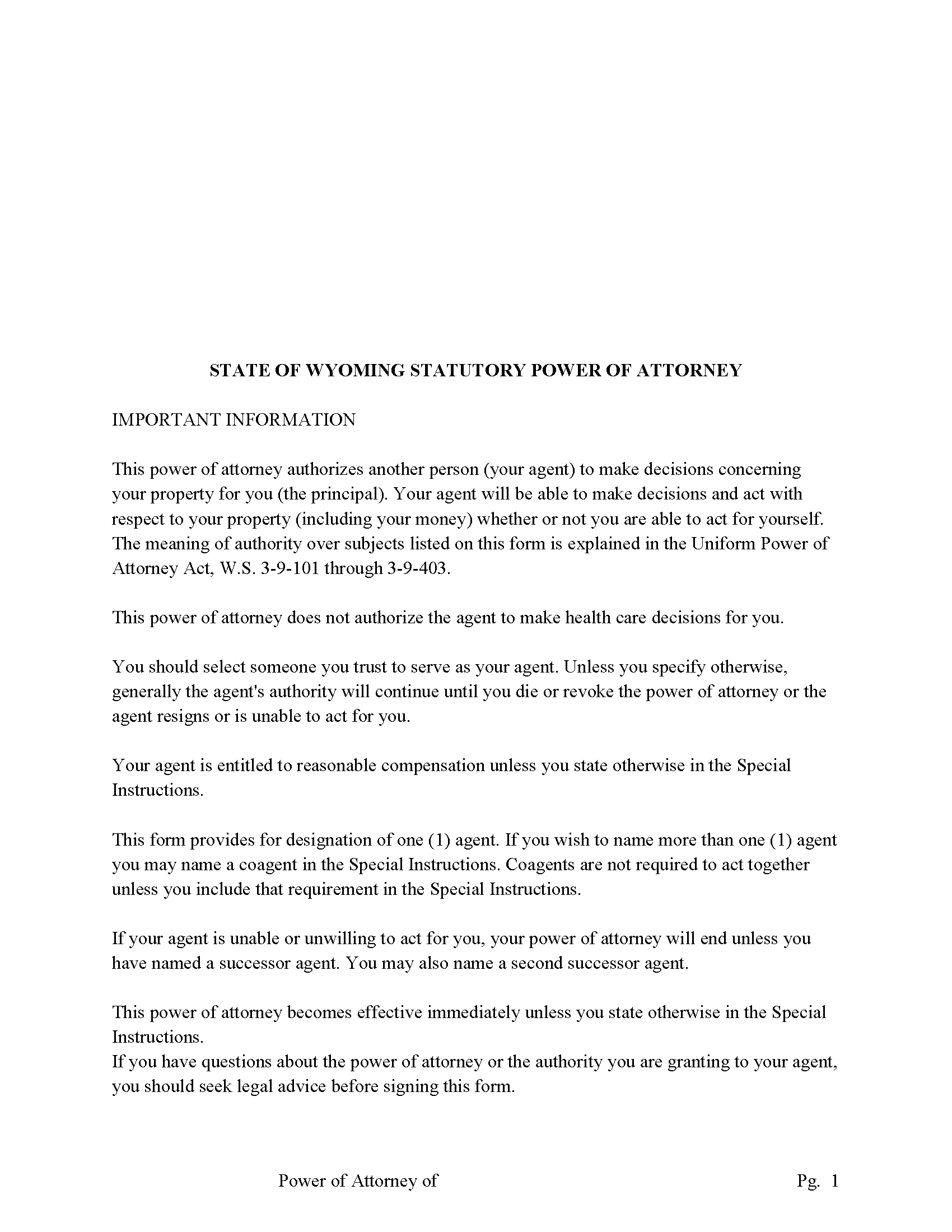
This Power of Attorney follows the Wyoming "Uniform Power of Attorney Act." (Statutes 3-9-101 through 3-9-403.) (W.S. 3-9-102 (xiv))
Use this form to appoint one or more agent(s) to act on your behalf. Successor, second successor and co-agent(s) may also be appointed. (Unless the power of attorney otherwise provides, each co-agent may exercise its authority independently.) (W.S. 3-9-111(a))
(A Conservator of the principal's estate or guardian of the principal's person) may also be nominated, in the event (protective proceedings for the principal's estate or person are begun) by the court. (Except for good cause shown or disqualification, the court shall make its appointment in accordance with the principal's most recent nomination.) (W.S. 3-9-108 (a))
This power of attorney is (durable) and (is not terminated by the principal's incapacity.) (W.S. 3-9-102 (ii)). Unless you specify otherwise, generally the agent's authority will continue until you die or revoke the power of attorney or the agent resigns or is unable to act for you.
This power of attorney is governed (by the law of the jurisdiction in which the power of attorney was executed.) (W.S.3-9-107)
A property add... More Information about the Wyoming Statutory Durable Power of Attorney
Disclaimer of Interest
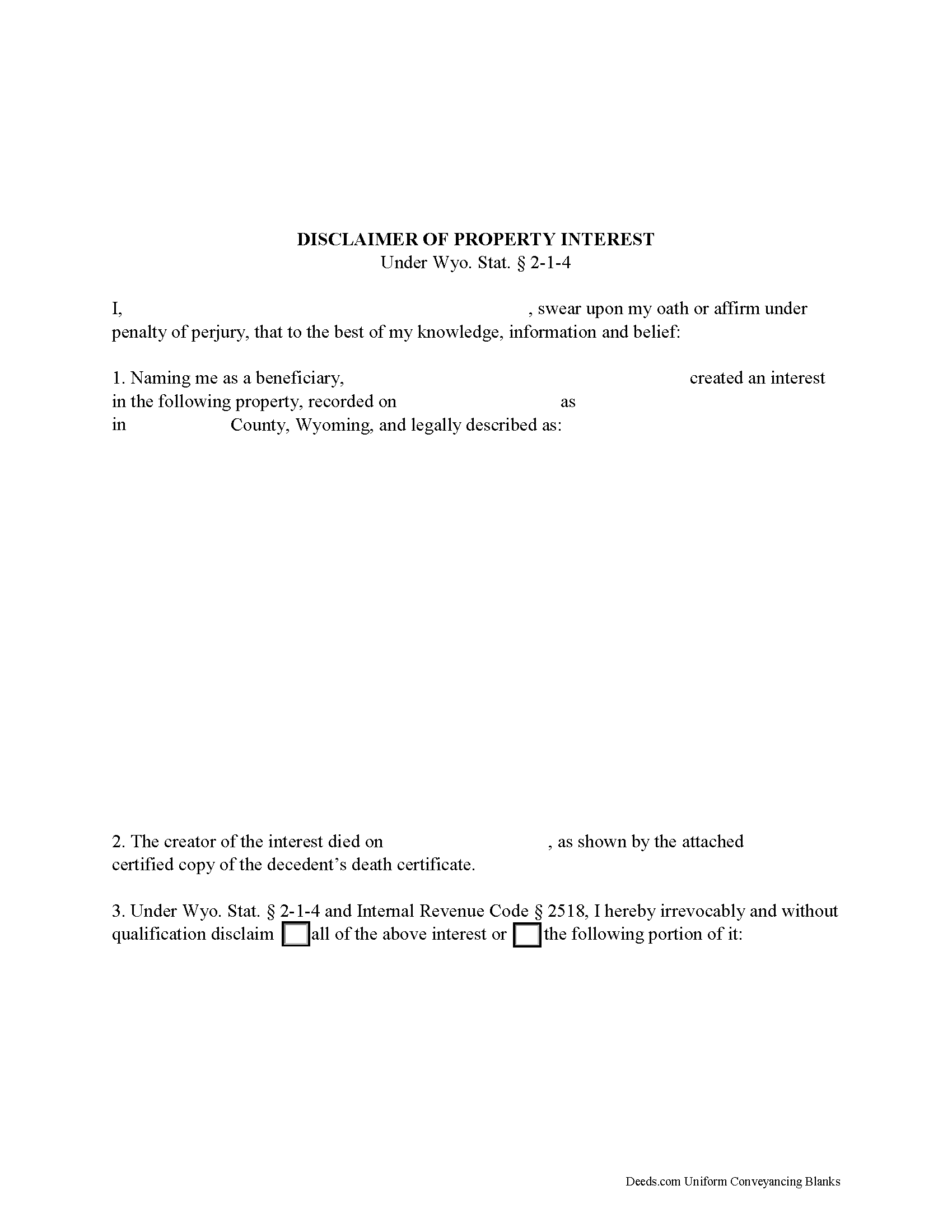
Under the Wyoming Statutes, the beneficiary of an interest in property may disclaim/renounce the gift, either in part or in full (Wyo. Stat. 2-1-4). Note that the option to disclaim/renounce is only available to beneficiaries who have not acted in any way to indicate acceptance or ownership of the interest (2-1-403(a)(iii)).
The document must be a written irrevocable and unqualified refusal to accept any interest in the property (2-1-403(a)(i)). Include a legal description of the interest and have disclaimant sign the document.
Deliver the disclaimer within nine months of the transfer (e.g., the death of the creator of the interest) to the transferor, his or her legal representative, or to the holder of legal title to the property to which the interest relates (2-1-40(a)(ii)). If real property is involved, avoid any ambiguity regarding the chain of title by recording a copy of the document with the county clerk of the county in which the property is located.
A disclaimer is irrevocable and binding, so be sure to consult an attorney when in doubt about the drawbacks and benefits. If the interest arises out of jointly-owned property, seek legal advice as well.
(Wyomi... More Information about the Wyoming Disclaimer of Interest
Affidavit of Trust
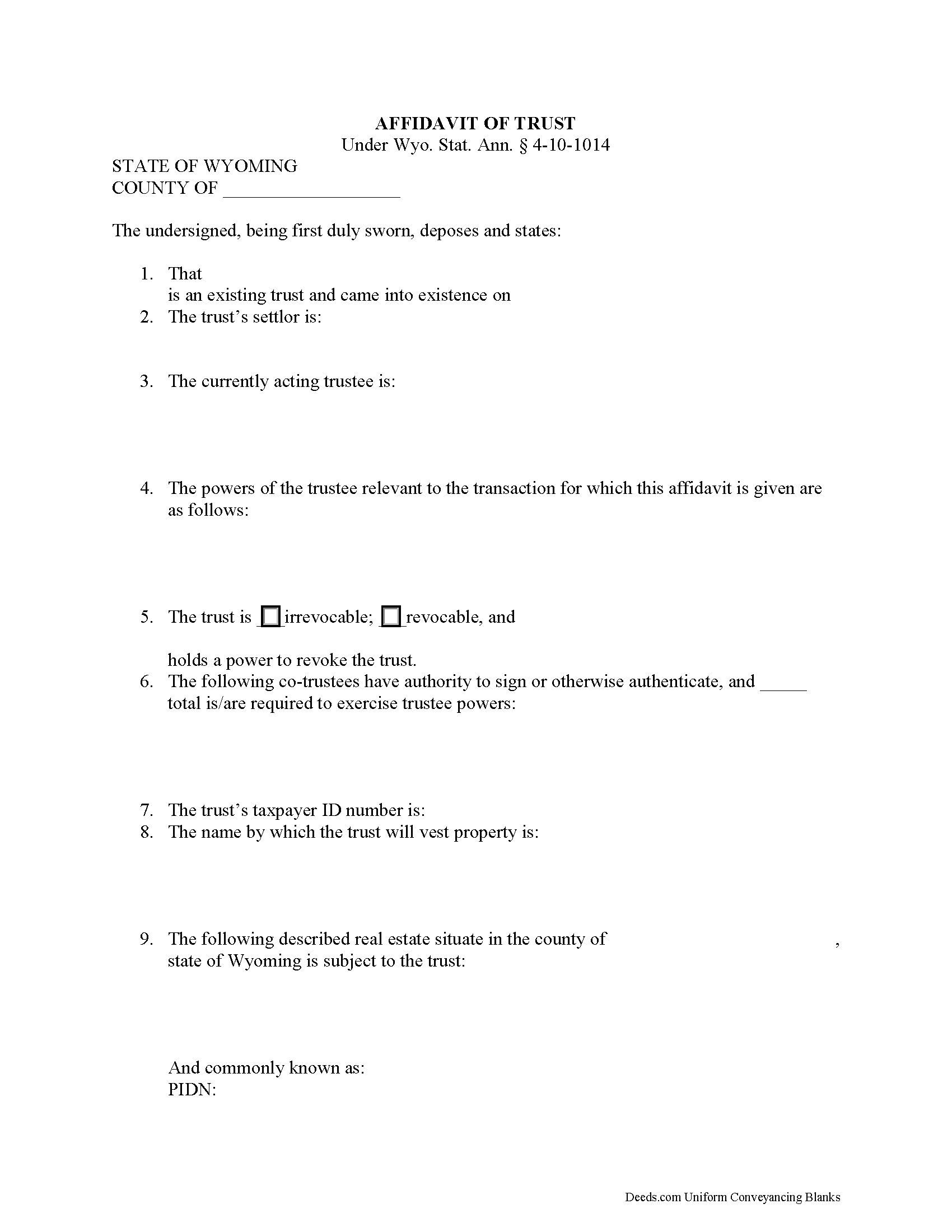
In a trust relationship, a settlor transfers one or more assets to another (the trustee), who holds and manages them for the benefit of a third (the beneficiary). In a living trust, the settlor indicates the intent to create a trust by executing a document called the trust instrument. This document sets out the trust's provisions and allows the settlor to plan how his assets will be distributed upon his death, without the requirement that his estate go through probate.
In the place of the entire trust document, a trustee in Wyoming may present an affidavit of trust to any person who is not a trust beneficiary. Codified as part of the Uniform Trust Code at Wyo. Stat. Ann. 4-10-1014, the document certifies that a trust exists and that the trustee has the authority to engage in the business at-hand with the recipient on behalf of said trust. Instead of summarizing the entire trust agreement, the affidavit contains only the information relevant to the current transaction, allowing the settlor to maintain the privacy of his/her estate plans (including the identity of trust beneficiaries).
As specified by statute, the affidavit is signed and sworn to before an appropriate officia... More Information about the Wyoming Affidavit of Trust